
“I Make Records
Of
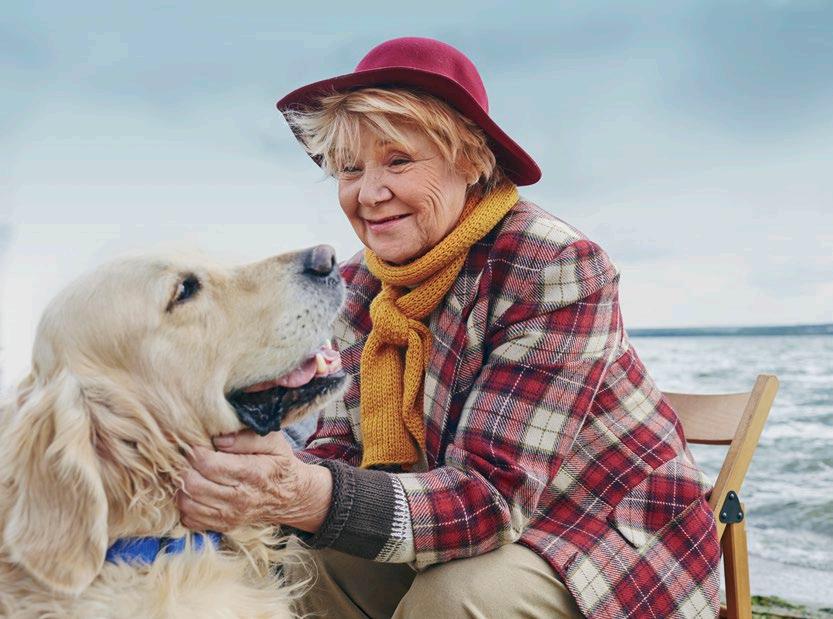
Make sure your dog is cared for with a Canine Care Card


“I Make Records
Of

Make sure your dog is cared for with a Canine Care Card
You’ve always done what you can to protect your fourlegged friend, and that shouldn’t change when life does. With a Canine Care Card, you won’t have to worry about what’s next for them, because Dogs Trust will look after and rehome them at one of our 20 rehoming centres across the UK.
Apply online to get your FREE Canine Care Card at: dogstrust.org.uk/ccc
Email: ccc@dogstrust.org.uk or call us directly: 020 7837 0006
Please quote “334799”, or complete this coupon:
Please send me a Dogs Trust Canine Care Card application form (Please fill out in block capitals)
For more information email: infopack@dogstrust.org.uk or call: 020 7837 0006
Please quote “334717” or complete this coupon:
16 IT’S A MANN’S WORLD
Olly Mann discovers his collection of old cassettes and, with them, an entire lifetime of fond memories
ENTERTAINMENT
20 INTERVIEW: STING
The iconic musician opens up about The Police, failure and why he still loves making music after all these years
28
“I REMEMBER”: BOY GEORGE
The lead singer of Culture Club looks back on his childhood, playing with Band Aid and overcoming addiction
HEALTH
38 HYPERHIDROSIS
Why we need to start taking abnormally excessive sweating more seriously
56 HOME REMEDIES
Reader’s Digest editors from around the world select their favourite home treatments for various ailments


INSPIRE
74 WHAT HEROES READ
Key workers on the books that are helping them survive
82 MEDITATIVE GAMING
Can video games aid mental health? Jenessa Williams finds out
TRAVEL
82 SPAIN’S BEST KEPT SECRET
Discover the breathtaking landscapes and world-class cuisine of Spain’s Asturias

Kilos of ripe fruit bursting with flavourthe way fruit always used to taste - right there in your garden. A joy for children and adults alike.
Look forward to watching delicious fruit grow from the comfort and







Succulent fruits of superior - batch harvested - quality Advances in agronomic research have allowed our professional gr to cultivate a more natural tasting fruit, one that has all the as it used to be, before mass production and over farming chang Our column fruits are crisp, juicy, sweet and fragrant. You’ll be pleasantly surprised to see the jealousy on the faces of your neighbours a They’ll see column after column of succulent zesty flesh growing right on your balcony, terrace or garden – and those irresistible bright colours - all year round. Children (or grandchildren) will love watching your fruit grow, checking them for ripeness, choosing which ones to pick then filling up their baskets. Give your garden a little kiss from nature.




For patios, gardens or terraces - casual or professional gardeners alike. Just add water!
Making the most of your garden with luxurious Column Fruit Trees couldn’t be easier. They don’t require any special knowledge to plant or keep, all you have to do is add water! What’s more they’re 100% organic, growing fruit you can share safely with the whole family. It really is child’s play! And the cherry on the cake is that they don’t require maintenance. Of course if you wish to, you can restrict the height of your 70cm shrub by cutting it regularly: 1 metre, 1.5 metres, 2 metres - you decide.
How are we able to sell our trees from £7.48 when outlets and online retail up to £39 per tree?
The answer is twofold 1) We’re driven by the passion that every superior Column Fruit Tree sold makes happier customers and smarter gardens. 2) Once we learned grower’s secrets from 20 years of Agronomical research - how to cultivate these beautiful garden shrubs – we then secured our own supply chain. As a result of keeping resellers or separate distributors out of the equation, we can happily offer you our award winning Column Trees at an unbeatable price.
Don’t waste a second
The planting period runs from January to April, so don’t delay! Buy today and you could be harvesting your fruit very soon - just a few months after planting.
















Confused About Equity Release? Get The Facts.
Confused About Equity Release? Get The Facts.
Equity release has soared in popularity, yet many people still have questions over how the process actually works.
Equity release has soared in popularity, yet many people still have questions over how the process actually works.
Equity release has soared in popularity, yet many people still have questions over how the process actually works.
In our guide we explain how to boost your finances by releasing money tied up in your home. Packed with customer stories, facts and figures, why not find out if equity release could work for you?
In our guide we explain how to boost your finances by releasing money tied up in your home. Packed with customer stories, facts and figures, why not find out if equity release could work for you?
In our guide we explain how to boost your finances by releasing money tied up in your home. Packed with customer stories, facts and figures, why not find out if equity release could work for you?
Get your FREE copy of the Reader’s Digest Guide today.
Get your FREE copy of the Reader’s Digest Guide today.
Get your FREE copy of the Reader’s Digest Guide today.
CALL FREEPHONE 0800 023 0225 or visit: www.readersdigest.co.uk/er9
CALL FREEPHONE 0800 023 0225 or visit: www.readersdigest.co.uk/er9
CALL FREEPHONE 0800 023 0225 or visit: www.readersdigest.co.uk/er9
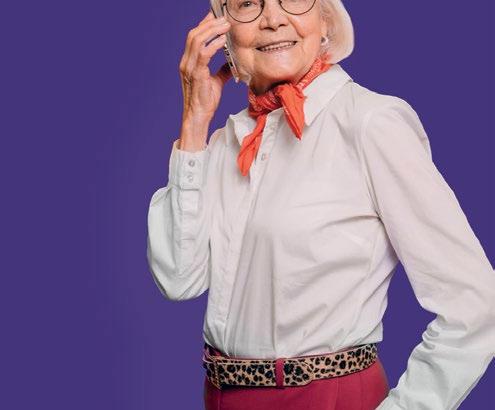
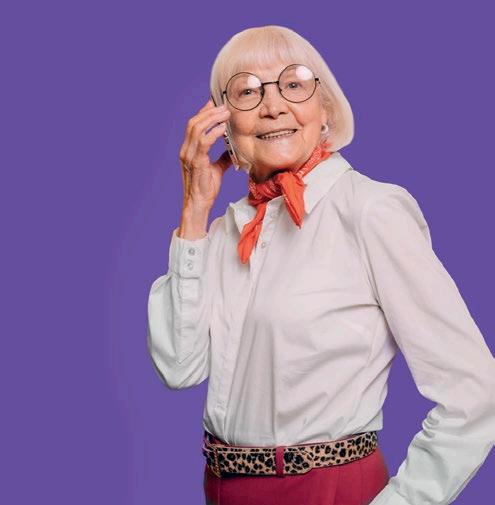
This is a Lifetime Mortgage which may impact the value of your estate and could affect your entitlement to means tested benefits. To understand the features and risks, ask for a personalised illustration. Reader’s Digest Equity Release is a trading style of Responsible Life Limited. Only if your case completes will Responsible Life Limited charge an advice fee, currently not exceeding £1,490.

This is a Lifetime Mortgage which may impact the value of your estate and could affect your entitlement to means tested benefits. To understand the features and risks, ask for a personalised illustration. Reader’s Digest Equity Release is a trading style of Responsible Life Limited. Only if your case completes will Responsible Life Limited charge an advice fee,
This is a Lifetime Mortgage which may impact the value of your entitlement to means tested benefits. To understand the features personalised illustration. Reader’s Digest Equity Release is a trading style of Responsible Life Limited. Only if your case completes will Responsible Life Limited charge an advice fee, currently not exceeding £1,490.
SENIOR EDITORS Anna Walker, Eva Mackevic
EDITORIAL ASSISTANT Jessica Lone Summers
ART DIRECTOR Richard Cooke
ADVERTISING Jigs Pankhania
MARKETING Sarah Hughes
HEAD OF FINANCE Santwana Singh
FINANCE MANAGER Irving Efren
MANAGING DIRECTOR Julie Leach
CHAIRMAN Gary Hopkins
subscriber enquiries, please
WE PAY...
£50 for the star letter and £30 for regular letters.
Email readersletters@readers digest.co.uk or go to readers digest.co.uk/contact-us
WE ALSO PAY...
£30 for the true stories, anecdotes, jokes in Laugh! and You Couldn’t Make It Up…, and contributions to end-ofarticle fillers and My Great Escape.
Email excerpts@readersdigest.co.uk or go to readersdigest.co.uk/contact-us
We cannot acknowledge or return unpublished items or unsolicited article-length manuscripts. Do not send SAEs. Article-length stories, poetry and cartoons are not requested.
TRUSTED MEDIA BRANDS INC (USA)
President and Chief Executive Officer
Bonnie Kintzer
Editor-in-Chief, International Magazines
Raimo Moysa
number below
Contact Customer Services for renewals, gifts, address changes, payments, account information and all other enquiries. Call 0330 333 2220* or email customer_service@readersdigest.co.uk
Reader’s Digest is also available in audio and accessible etext editions from RNIB Newsagent, for blind and partially sighted readers. Call the RNIB Helpline on 0303 123 9999 or visit rnib.org.uk/newsagent
Annual subscriptions are available to be delivered monthly direct to your door. For our latest offers please visit readersdigest.co.uk/subscribe Or telephone us today on 01778 392461
Gift subscriptions also available. UK rates may vary. Overseas rates: Republic of Ireland €50, Rest of the World €60.
We are fearful of the present, uncertain of the future and longing for the past that used to be.
Even in the Blitz of World War 2 people went about life as best they could. But, the country fell silent to Covid-19
How did lockdown a ect you?
People lost their jobs and incomes, children’s schooling was interrupted, weddings were postponed and even funerals could not occur in the usual manner.
Unable to bid farewell to a loved one was one of the saddest events in lockdown. Death lives long in the minds of those who are left behind.

We saw ‘the good, the bad and the ugly’ of human nature being played out during lockdown.






Could things have been done di erently? Would they have made a di erence?
Would you have chosen to be in the shoes of the Prime Minister in handling this crisis?
LOCKDOWN 2020 touches the lives of most people. Read it and identify your life in the words of the author.


We have to accept the new normal and look after ourselves. We would then be able to return to a semblance of the quality life we had.
Will Covid-19 be the last or could it happen again? The answer is in LOCKDOWN 2020















www.barnesandnoble.com


In the past 12 months, we’ve all had to find our own ways to maintain our mental health, as the global COVID-19 pandemic turned everyday life on its head. For some people that’s involved long walks in the countryside, for others, cosy nights in front of the telly. But for the people interviewed on p82, video games have proven the best respite from the unsettling twists and turns of the coronavirus news cycle.
Elsewhere this month, we’re welcoming a new writer to the fold, as Catherine Summers—better known as Not Dressed As Lamb to fans of her blog—joins us as our new fashion editor. Turn to p114 to read her first instalment, in which she sings the praises of bold and bright waterproofs—just in time to see us through those April showers.
Looking for something inspiring to read? This month, we’ve got all the literary bases covered. On p74, we asked 14 key workers— from doctors and teachers to prison officers and care home workers— which books have helped them survive one of the toughest challenges of their lives—the coronavirus pandemic. What we ended up with is a colourful panoply of raw poetry, entrancing short stories and empowering novels that helped our heroes shut out the stress and escape the gruelling everyday realities of their work for a moment.

And on p122, our book critic James Walton puts entertainer Mel Giedroyc’s debut novel to the test, and wonders whether there’s life after death as he examines Dr Bruce Greyson’s fascinating book about near-death experiences.
facebook.com/readersdigestuk
Packed with over 250 pages of photos and stories, MAF’s colourful new coffee-table book will take you on a flight through the decades from 1945 to the present day!

From the ashes of WWII, a handful of Christian airmen and women dreamed of using aircraft to deliver peace and healing to isolated communities.
Through the pages of Above and Beyond , you can travel to the furthest corners of the world to encounter hidden tribes, lifesaving partnerships, and inspiring stories that span seven decades of MAF’s inspiring history!
Scan the QR code or visit our website below to order your discounted copy.


We pay £50 for Letter of the Month and £30 for all others
How refreshing to read about Niksen, the Dutch art of mindfulness, in the February issue. The word itself literally means “to do nothing” and it was wonderful to read that expert Annette Lavrijsen agrees with me that it can be a positive thing to take time out and reflect on life, sit down and not actually do anything for a set time each day!
I think my late father was ahead of the times as I can recall him during my childhood in the 1970s often sat
Your fantastic article “What’s Wrong with Our Nursing Homes?” highlighted so well the startling problems within the care system. Nursing homes need greater investment, training and higher salaries to recruit the most dedicated workers and entice young people into this growing sector. Lessons must be learned, then urgent change needs to happen in so many ways, but not just

contemplating life and telling me to take time to think about what I wanted to do and not just rush from one thing to another!
The article emphasised that I’m not being lazy by just taking time to sit down and do nothing but that it’s beneficial for my physical and mental health.
MELANIE LODGE, Yorkshirein nursing homes. With more and more people living longer, attitudes towards older people must change too: they should be respected, nurtured and revered as they are in some other countries and we should listen to their wisdom and learn from them. Isolation is also now prevalent in our society and on the increase. We must find ways to combat this growing problem by showing compassion and
becoming more involved with our seniors in society. Engage the younger generation with the older generation: to learn from them, be inspired by them and really connect. Old age comes to all of us—if we are lucky—and we should be treated with respect and dignity at any age. Don’t we all have a duty of care in this civilised society we live in?
GERALDINE SYSON, Glasgow
Lisa Fitterman’s article in the February issue about the crisis in European nursing homes was no surprise, and there seems to be no end in sight. Of the suggestions by Agnes Buzyn—the most impactful one—is finding a way of caring for our seniors in their own home with some routine monitoring. I would add that this care could also take place in a relative’s home. I grew up in Africa with nonexistent nursing homes, meaning senior citizens had to be looked after by their own relatives. I remember as a kid my mum and her two sisters taking turns to care for my grandmother, at the time well into her nineties. Europe could do well to learn this model and adapt it to suit European circumstances. This in turn will allow only a small number of nursing homes to operate, without the need for a huge workforce to run them. The critical staff shortages in nursing homes will not disappear by pumping in more money, if the NHS healthcare staff shortages are anything to go by.
MANYANDO MILUPI, Doncaster
Eileen Horan and her work to help abused women “disappear” sounds like an absolute godsend to terrified victims everywhere but a scheme like that needs to be seriously scaled up to protect more women.
When you’ve faced sustained physical and emotional abuse from a partner it can seem like there is nowhere safe to run to, especially when funding for women’s refuges means places are severely limited at the best of times. And with so many abusers and victims confined to their homes during lockdown the situation has become even more dire. Even when attackers have been jailed there are some women who will never be free of their control and able to live without constantly looking over their shoulder.
If Eileen Horan shared her valuable knowledge with women’s protection organisations everywhere the lives of many more victims could be transformed and, in many cases, saved.
ANN JOHNSON, Norfolk

After spending far too much time on apps and social media over the last few years, Gemma decided it was time for a change.
“I’d started to get really frustrated with how I was spending my spare time”, said Gemma, 54 from London. “One day, I realised I’d checked my phone over 100 times. Something had to give.”
“So, I deleted my social media apps from my phone and made a promise to myself to do something more positive with my time.”
At first, it wasn’t easy for Gemma to find things to do.
“I’m embarrassed to admit that I’d stopped reading as much over the last couple of years. But, then a friend recommended Readly to me. I’d always loved reading magazines and thought it was time to give them a go again.
The selection is amazing: food, fitness, lifestyle, culture, crafts and

hobbies are all covered. I’ve been using Readly in the evenings to relax instead of watching TV. I’ve also found it great for inspiration and ideas for new recipes. We’ve been doing some re-decorating, so the interior design section has been really helpful. Having so many past issues to browse through is just fantastic. I can’t think how much I would’ve had to spend to get all that content. If you read more than a couple of magazines, you’ll be saving money each month.
My husband loves the car, sport and business magazines. And we cuddle up and do the puzzles and crosswords together now as well!
As it’s a family membership, I’ve shared my subscription with my daughter who has started using it. She’s a teacher and loves getting inspiration from the kids news, science and history magazines.”
To find out more about Readly, and to try 1 month for free, please go to www.readly.com/digest



A giant stroll for humanity. The world was paying attention when on April 16, 2020, just two weeks before his 100th birthday, Second World War veteran Captain Tom Moore raised more than £32 million for NHS Charities Together in honour of the hard work of all the people working to fight the coronavirus crisis. As well as their donations, people from around the world sent in their thanks along with roughly 125 000 birthday cards (previous page). Sadly, Captain Tom Moore himself died from a coronavirus infection in February this year. So we bid farewell to this remarkable man, who not only donated money but also offered us hope in a time where hope was so sorely needed. The world loses yet another hero.
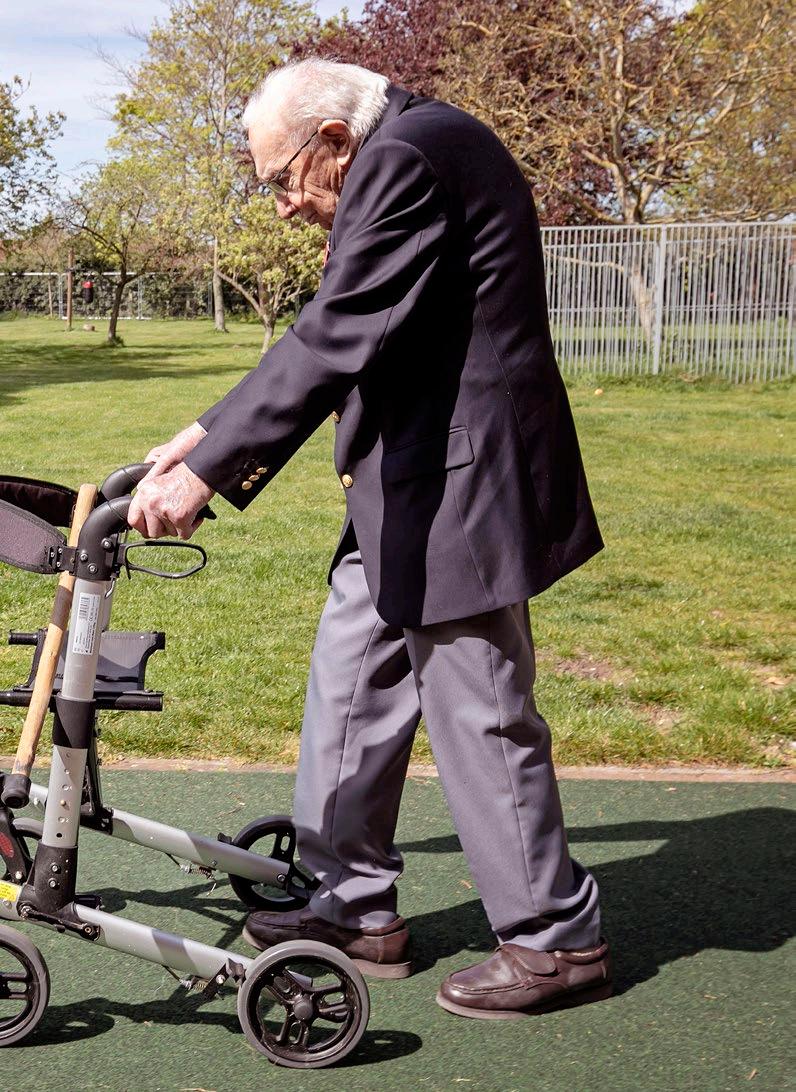
This month, Olly Mann ponders the sentimentality of forgotten audios, and why he won't be throwing them out
Ihave always been a diligent archivist. All my photos are in albums. My radio scripts are boxed away; my TV appearances, however fleeting, uploaded to Dropbox. Documents of note (my university admission letter, my ticket to the 2012 Olympics) reside in a sacred filing cabinet.
Frankly, I’m not sure why I do this. Perhaps, as a young adult, I fantasised the British Library would one day build an annexe in my honour, so that future generations might marvel at my achievements and pronouncements. Now, nearly

Olly Mann presents Four Thought for BBC Radio 4, and the award-winning podcasts The Modern Mann and Answer Me This!
40, I am under no such illusions. I understand that my precious memories will be landfill by 2100. Yet still, the mementoes pile up.
Lockdown offered an opportunity to explore this archive: most recently, a box of cassettes and minidiscs, committed to the attic circa 2005. These are mostly mixtapes—songs
I taped off the radio as a teenager, or burned off CDs borrowed from the library. I can confirm that "Your Woman" by White Town (1997) and "Walk Like A Panther" by The All Seeing I (1999) are both still bangers. On reflection, I am less convinced by "Hooray For Boobies" by The Bloodhound Gang.
Original recordings, though, make up the rest of the audio. For example, my school singing teacher playing the accompaniment to "With One Look" from Sunset Boulevard, so I
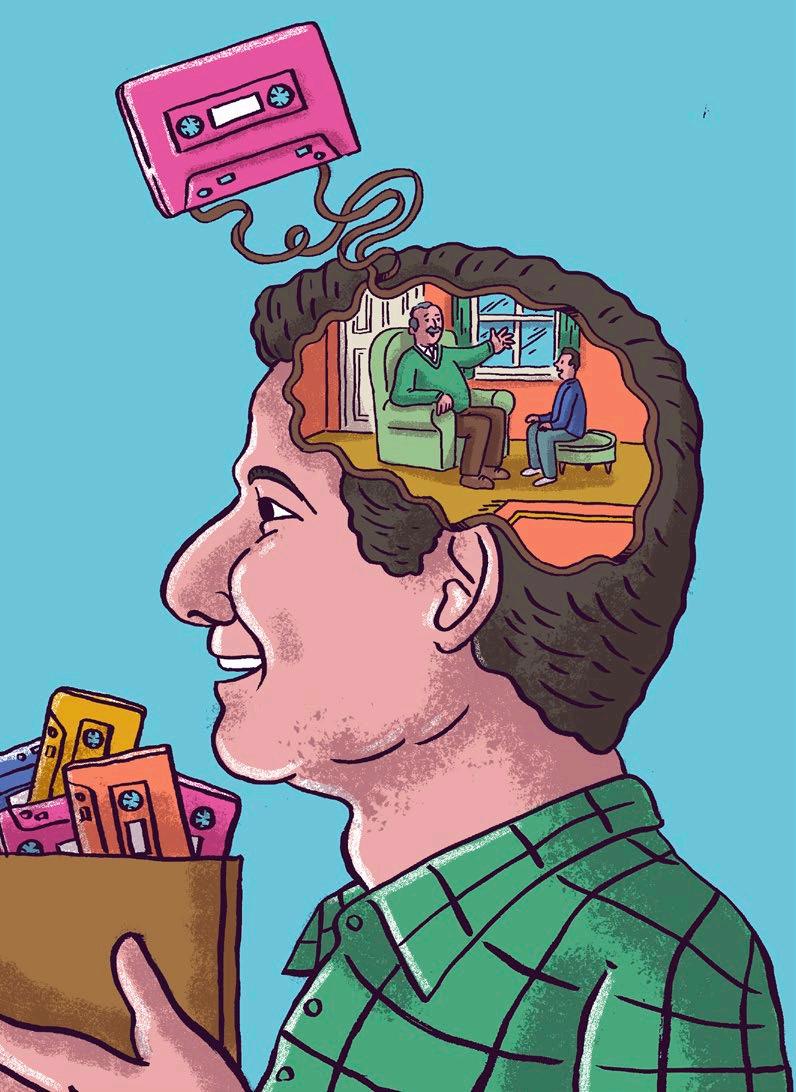
could practise during the summer holidays (the song suited my range, but as a 17-year-old lad I didn’t want my mates to know I was portraying Norma Desmond—so I changed the lyrical climax to "Norman’s home at last’" as if playing a Hollywood diva called Norman made it any better).
Also in the box: a rendition of "Always On My Mind" produced in a £10 karaoke booth at London's Trocadero in 1998. I’d completely forgotten its existence, but within seconds of pressing play the whole thing came flooding back. My backing singers were my school friends Ben (who ended up being my Best Man) and Jenny (who ended up being my wife). It might have been rather moving, were it not for the fact that we sing the whole thing in the style of our GCSE drama teacher.
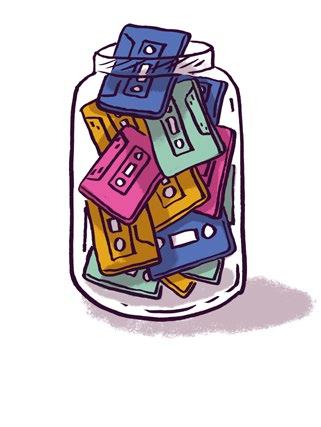
still stream regularly).
Whereas, listening back, my skills as a rock writer were woeful. The clichés tumbling out my mouth include: "How do you write a song?", "Who would you like to duet with?", and (really), "Are you influenced by The Beatles?" Cringe! But the revelation is, it sounds like Jay was just as jittery as I was. I am playing at being a journalist, and he (just three years older than me) is playing at being a pop star.
I was 20 when I recorded the next one: an interview with then up-andcoming singer Matthew Jay, for a student newspaper. This one I do remember, because it was my first ever assignment as a "journalist", and I was incredibly nervous, and intimidated to be invited on to his tour bus, backstage at the student union, to do it.
Jay was a formidable talent (his debut album Draw is, in my view, an under-rated classic, which I
Two years later, he was dead, having fallen from his seventh-floor flat in circumstances that may have been suicide (he left no note, and an inquest returned an open verdict). Knowing this now, some of my embarrassingly entry-level questions ("Where do you see yourself in ten years’ time?", "What truly makes you happy?") have a poignancy I could not have predicted. Listening back, I considered the illustrious career he might have had—I reckon he’d have gone on to sell as many records as fellow Noughties troubadours David Gray and Damien Rice. Whereas I, clearly, was not destined for the NME.
The last cassette I stumbled upon in this jar of hearts was labelled "Grandpa Matt’s Marbella Stories".
I remember making it, in 1986— sitting at my grandfather’s knee with a JVC cassette recorder, sheltering from the Spanish sun—and listening back frequently as a boy. So, I invited my five year-old son Harvey to listen in.
My grandfather died in 1998. I hadn’t heard his voice for over 20 years. So to hear him talking directly to me (albeit five-year-old me) was unexpectedly stirring. He sounded rougher round the edges than I remember, with more of an estuary accent, but the smile in his voice and his resonant benevolence instantly triggered all my happiest memories of seeing him.
Harvey heard "The Swan Story", a silly yarn Grandpa was evidently making up as he went along, based on my reception at the time. Watching Harvey’s reactions to the story’s twists and turns, I realised I was re-living an experience from 35 years ago—but, this time, from my grandfather’s perspective, watching a young boy enjoying a tall tale.
For Harvey, this was the moment my mum’s dad, a ghost hitherto, leapt out of photographs and into his heart.
I’ve bought a cheap dongle off Amazon to digitise these tapes. Again, I’m not quite sure why I’m doing it. But I do know: it’s not for anyone else. It’s for me. n
How well do you know your published works? Answers below
1. What was Stephen King's first published novel?
2. Homer is known for The Illiad and which other work?
3. Who's the current Poet Laureate?
4. Who wrote Black Beauty?
5. What's the cat called in Macbeth?
6. Where did Toad from Kenneth Grahame's Wind in the Willows live?
6.Toad Hall
5.Greymalkin
4.Anna Sewell
3. Joy Harjo
1. Carrie 2. The Odyssey
Answers:
Sting returns to a place of collaborative creativity with the release of his new album Duets; even if, in almost every other way, he continues to find comfort, innocence and improvement in blissful isolation
He is Sting, he is Gordon Sumner, he is the exfrontman of one of the most pioneering bands of the post-punk era, who sold 75 million records worldwide; he is the right man to ask about a Police reunion, right? Wrong.
Speaking to Sting, The Police can feel like the go-to topic for every lazy or poorly-prepared interviewer. Even a journalist suddenly finding themselves bereft of any other questions would be best advised to steer clear from probing the idea of the London-formed threepiece linking hands again, instead perhaps commenting on the impeccable style or excellent health
of the 69-year-old frontman. It’s not because Sting is particularly offended by the approach, nor that he has spent the best part of four decades cultivating a reputation as a wholly content solo artist (although that’s true). Perhaps it’s more that he is a creative who doesn’t necessarily crave the company of others. To typify this, there is an intriguing shot from the end of The Police’s final gig, held at the Melbourne Showgrounds on March 4, 1984. Drummer Stewart Copeland and lead guitarist Andy Summers stare out into the worshipping crowd knowing the era of the band had come to a close just a few moments


before. The camera lingers on their faces to capture the raw emotion of the moment, as the congregation pours a sombre, messy mass of elation and profound sadness onto the musicians. And then there’s Sting—grateful for the adulation but, instead of reflective and melancholy like everyone else in the arena, he’s alive, excited and focused straight away on the solo experiences he knows he is going to create for himself.
Even when the band reformed in 2007 for a somewhat ill-fated reunion, the 151-date project replenished bank balances, sure, but it also cemented the reality that these were three men who should leave the past exactly where it is.
“At the time I labelled the tour an exercise in nostalgia. That was
simply how I felt, and is still how I feel today,” Sting begins. “I think it’s OK to be honest about your feelings and that was the way it went for me.
“That’s not a slight on the people I was with or the way things panned out; it’s just how I saw it by the end; and let’s be honest, that’s not how I wanted to remember it. If I thought that would be the emotion I’d be leaving with, I wouldn’t have done it in the first place.”
Sting’s bandmates have been similarly non-complementary, not so much about the experience, but on their frontman’s aversion to life as a threesome.
“I think it happens to all these white male singers—it’s a classic mistake,” says Andy Summers. “The singers all want the solo


“TO HAVE TOTAL CREATIVE FREEDOM IS, FOR ME, THE ULTIMATE THRILL OF BEING SOLO”
career—they should go and do a solo album then go back to the power base where the real chemistry and magic is, because you’ll never get that chemistry and magic again. It was the sound of the three of us— that’s what made it, and it’s never been as good since. Look at the tour. We had an incredible turnout all across the world, and no one can do that on their own.”
Deep down, you know Summers yearns for Sting to feel the same way he does. Like a scorned lover desperately trying to convince an ex they still have feelings towards them. Yet, there are far too many frayed emotional ties to make another reunion a possibility. And it would be pointless. Not only did the experiment fail, twice, but Sting is entirely his own man now, to his
immense credit… which takes us back to why he wouldn’t want The Police back together.
“I think there is a freedom in being a solo artist,” he says. “It’s not a power thing, at all, it’s just about producing exactly the brand and style of music that feels right for you. Music, in every form, is a collaborative process, but never more so than in a band, where you have to consider other people almost more than you do yourself.
“To have total creative freedom is, for me, the ultimate thrill of being a solo artist.”
So while some music journalists have speculated that Sting’s ego was the thing that broke up the band, they should perhaps note that it’s a commodity conspicuous by its absence for a long time. The

“WHEN I MAKE A RECORD, I WANT TO GO ON A JOURNEY”
songwriter, in 2021, is, ultimately, a man at peace. He is reflective, satisfied in his achievements, and undoubtedly driven by creative satisfaction rather than industry awards or dollar bills.
“It’s great fun to have a hit record, it really is, but it’s not why I make records, and it never has been, to be honest. It’s easy to get swept along in the excitement of the charts—a lot more so in the Eighties than it is today—but the truth is I make records out of love and curiosity, even if it’s always nice to have something on the radio.”
For someone who celebrates five decades of songwriting in 2021, and whose music has crossed multiple genres—rock, pop, folk, reggae and new wave—Sting’s influences
continue to harness breadth and bravery. “When I make a record I want to go on a journey. I need to learn as much about music as the listener—that’s really important to me. It’s been a long time since I went into a project wanting to play it safe,” he explains. “Neither do I want the musicians alongside me to play it safe, which is often why I will take some musicians out of genre. You cannot perform to your optimum if you are in a safe, protected environment. Everyone needs to sit on the edge of risk and failure to get the best out of themselves.
“I’m always trying to broaden what I listen to. Everything I’ve ever heard—bad, good and indifferent— has conditioned my opinions about music. I don’t believe there are any bad experiences.”

Indeed, Sting is a man of culture and influence that stretches way beyond the sound that emanates from a speaker. Long before The Police signed their first record deal with A&M in 1977, the musician’s pursuit of experience saw him immerse himself in the brutally diverse environments of building sites, office spaces and even school staff rooms.
“I liked all of those jobs, albeit in very different ways,” he said. “I was never embarrassed about any of the jobs I did, they all connected me with real worlds, and it wasn’t until I was 26 that the music industry presented itself to me.
“I’m glad of that,” he says. “I’m glad I had many years of struggle and obscurity because that has only helped my psychology. If I hadn’t
had so long on the other side, I’m not sure how I would have survived fame.”
From early days earning his stripes around the Polish clubs of his native Wallsend on North Tyneside, where watching bands live could mean dodging punchups and the opposite sex in equal measure, Sting admits he struggles with the trend of modern era music entertainment where musicians are cherry-picked on reality shows. In a matter of weeks they are transformed from everyday members of the public to global superstars, and that’s problematic, he says.
“I feel the reason a lot of them crash and burn has much to do with the way that exposure comes about in the first place. You can ride
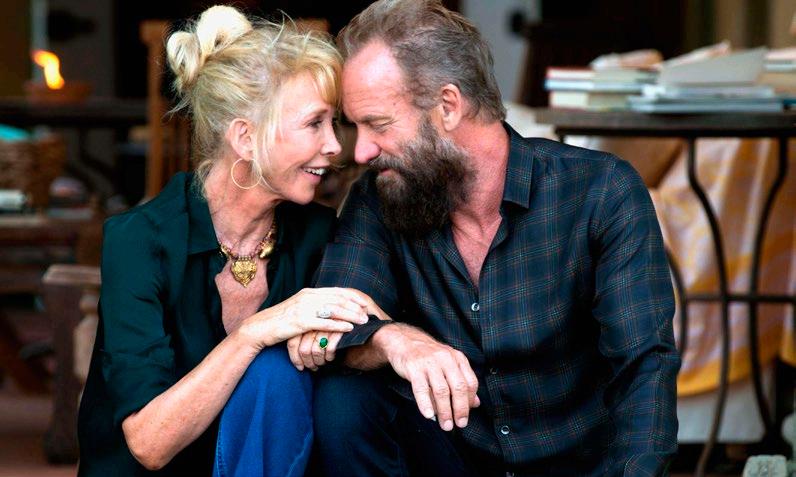
the wave for a while, but so many of those careers are built on loose foundations, on being fast-tracked to the top.
“The music industry is much like any other—there comes a point where it will need you to have done the hard yards, and if you haven’t it can be very difficult to sustain the whole thing.”
If there was someone who could shadow new entrants into the industry, it would undoubtedly be Sting, yet his time is best spent elsewhere these days. He remains a fierce devotee to philanthropic causes, having previously nailed his colours to the masts of Friends of the Earth, Amnesty International, victims of the September 11 attacks, plus humanitarian projects in Brazil and Tibet. And in June he will be
back out on the road with his My Songs tour. In his spare time he’s even making efforts to listen to his own music.
“I do that from time to time, it’s true,” he reveals. “It’s much nicer now there is a vinyl revival and we can all share in this incredible medium together. I had the great privilege of putting a record on the other day—you know, taking it out of the inner sleeve, putting on the turntable and lowering a needle onto it and hearing that lovely noise before the music starts.
“It’s a fantastic ritual that I actually miss so much that I’m going to go back to that—I’m going to go back to vinyl!”
Whether Sting’s regression ends there, we will have to wait and see.


“EVERYONE NEEDS TO SIT ON THE EDGE OF FAILURE TO GET THE BEST OUT OF THEMSELVES”
In recent years there are hints of a rebelliousness in collaborations that imply he’s not willing to simply fade away into one genre. From allowing Puff Daddy to sample his music, to making an entire album with Shaggy in 2018, to performing with artists as diverse as Craig David, Eric Clapton, Sam Moore and Julio Iglesias, it’s all proof of a man still enthralled and enchanted by music and, indeed, the world around him
“I am a citizen of the world—I vote, I pay tax, I’m a dad, I’m a husband. And this world isn’t any madder now than it was before; it’s just that in
the past it was presented to us then gone… people didn’t pore over it on social media for hours and hours. The important thing is we fill our lungs and keep breathing it in.”
For all his occasional seriousness, for every time he speaks his mind with bruising honesty, for everything he favours that is a distance from those rebellious postpunk roots—countless musicians half his age have long since given up on discovering something new about themselves, their music and the spaces around us. For Sting, the search goes on. n
In 2011 British intelligence forces hacked the website of Al-Qaeda’s magazine and replaced bomb-making instructions with a cupcake recipe
Source: abcnews.go.com



Boy George (59) is a British singer, songwriter, DJ and fashion designer, best known as the lead singer of the pop band Culture Club. Here, he looks back on growing up in south-east London, Band Aid and overcoming drug addiction


…I GREW UP IN JOAN CRESCENT IN ELTHAM. The road was nondescript and still is, and there was always the faint whirr of the A20 whenever you stepped into the garden or opened a window too wide. Growing up in south-east London was famously samey— it didn’t really matter who you were. You were in houses that felt comfortable and modern, but ultimately were there to bully families and individuals into conformity, sanity and normality, during times when there was always the dangerous hint of rebellion in the air.
WE HAD NICE FAMILY TIMES AND THERE WAS NEVER ANYTHING UNFULFILLED ABOUT MY CHILDHOOD, but I look back on it now and it was the epitome of normality. There was the telly, the record player, the vegetable patch, the trip to Danson Park. I always had the feeling I wanted to rebel against the sterility of it all, although I did

soon realise that sterility is a perfect breeding ground for love, affection and security. It is a fantastic platform for that.
SEEING DAVID BOWIE LIVE WAS A HUGE MOMENT FOR ME. I was 11. He gave kids a licence to say, "You can be an adult and a fantasy character, a magician, someone other than yourself." He inspired me, "Space Oddity" inspired me; and so many millions of others.
MY DAD WAS A TREMENDOUSLY HARD WORKER and it was often at the expense of the one thing we truly craved from him—time.
I WAS A STAND-OUT TEENAGER, AN EXHIBITIONIST, AND IN THE ROUGH CLIMATE OF 1970S LONDON, A LOT OF PEOPLE DIDN’T UNDERSTAND OR TOLERATE THAT. I was chased down the streets by lads who wanted to kick the s**t out of me. Thankfully, I was blessed with Olympic-like

athleticism and never got caught. I know I had to stay fit to survive, but it wasn’t a particularly comfortable existence—how could it be?
THE ATTITUDES NOW ARE OBVIOUSLY VERY DIFFERENT TO WHEN I WAS GROWING UP. As a young man I would go through various episodes—some where I was elated to have freedom and individualism and expression, albeit most of those were in the bedroom of my modest house in Eltham.
I’VE ALWAYS LOVED ARCHITECTURE. I remember a stunning red brick house by Blackheath Common that I used to stare at when I was a kid. It has this huge clear glass outhouse and I always wanted to see inside.


LONDON’S DIVERSITY WAS AS PREVALENT THEN AS IT IS NOW, ALBEIT PERHAPS IN DIFFERENT WAYS. I would take comfort in the fact that you could be in some opulent neighbourhood, yet you’d turn a corner and find some rough and ready council estate. It gave me a nice metaphor for life and a lot of hope and optimism when things went wrong in my life.
It basically said to me, "However uncomfortable this may be, there could be somewhere quite beautiful

just around the corner." Sure enough, there was… usually Blackheath!
I WAS OFTEN LURED TO BLACKHEATH BY THE GREATEST OXFAM SHOP IN THE WHOLE OF LONDON. Given the sorts of clothes I was buying when I was just discovering myself and my sexuality as a young teenager, I didn’t want the visibility of going to the West End to be seen buying all this kind of stuff. I had no need to, anyway, as Oxfam had some really incredible clothes. Perhaps it’s because Blackheath itself is a bit eccentric compared to most of south-east London, but the clothes most definitely followed suit.
I still go there today—it’s one of

my favourite areas in London. I love the space there—the fact you can stand in the middle of it and see just fields stretching away with just a rooftop or two in sight… and yet you are in the heart of south London.
IT WAS IN OXFAM IN BLACKHEATH THAT I MET ONE OF MY BEST FRIENDS MYRA, across the clothing rails, looking like a pair of freaks. If you want to meet people who have an alternative view on the world and who aren’t afraid to step outside the norm, go to a charity shop.
MY LIFE WAS ONE OF PRETTY HAPPY DISCOVERY in those early Culture Club days. The newspaper


headlines were about love triangles, drug accusations and all that stuff, but in reality every day was exciting. I used to hide away from the press by going for long walks around Kenwood House—I still do.
THAT SAID, IN THE PAST I WASN’T THAT CAUTIOUS ABOUT WHAT I PUT OUT THERE in regard to my private life. Perhaps I got a little too stung by that when I was growing up and I’m certainly more reserved now in terms of what I say.
TOURING WAS EXHAUSTING and always took a toll on us. I think our third album, Waking Up with the House on Fire , was a skeleton of what it should have been because we were all totally done in by a world tour we had just completed.
I ALMOST DIDN’T APPEAR ON THE BAND AID "DO THEY KNOW IT’S CHRISTMAS?" TRACK. I was doing the David Letterman show in New York when Bob [Geldof] called
me. I managed to get on the last Concorde flight of the day and make it back in time for the recording.
I HAVE ALWAYS HAD A MISTAKE IN ME… BUT THAT’S OK. As far as the troubles I had back in 2006 [Boy George called the police to his New York apartment to report a suspected burglary—officers instead found a stash of cocaine, which led to a month-long community service as a dustman on the streets of Manhattan] and 2009 [he served four months of a jail sentence after handcuffing and falsely imprisoning a male escort], of course, they are things I am not proud of. Yet at the same time they remind me that I hadn’t shaken off that nihilistic attitude of the past, nor would I ever want to. And every mistake is a positive life lesson… it really is.
I ALWAYS MAINTAINED THAT JAIL WOULD FINISH ME OFF, but it didn’t. You somehow find the strength. It was a life-changing

experience and I feel I came out of that situation with some wisdom and knowledge. I really don’t view that period in my life as negative… but I wouldn’t want to go back.
CIRCUIT AND TOURING AGAIN WAS A REVELATION FOR ME. It reconnected me with my past, without the chaos and without feeling I had to be the centre of attention. DJs are generally quite discreet—they hide in the background, they play for a couple of hours, then they disappear off again and go home.
CLEAN
OF DRUGS TRANSFORMED MY LIFE IN WAYS I DIDN’T EXPECT. There are the big things, of course,

but getting sober also led me to taking in nature so much more. I remember when I first got clean and walking over the Hampstead Heath thinking, I don’t know this place, I don’t recognise that tree over there or that hill, or that meadow, even though it’d been there forever.
I think I moved here a little prematurely in my twenties and didn’t properly appreciate it because of all the partying at the time. I’m older now—I can say, "Wow, it’s really serene here."
which, actually, is why I live there. I remember there being a big hullabaloo about a McDonald's coming into Hampstead and there was a campaign to stop it, albeit an unsuccessful one. Otherwise, it’s
pretty much the same as it ever was: quiet, affluent and leafy.
There’s a really great Japanese restaurant here called Jin Kichi that makes the best, most delicious maki rolls. And the King William IV pub is a nice place to hang out in.
I’VE LEARNED THAT WHEN YOU DABBLE IN CHAOS, DISORDER AND NIHILISTIC ENDEAVOURS, it really is those things that make the ground beneath your feet bumpy and uneven.
Essentially, you need to decide which one it is that you want in life, because you sure as hell can’t have both!
GETTING OLDER IS A GRADUAL, SLOW-BURNING PROCESS. It’s not like I turned 50 and said, "OK, I’m going to grow up now."
I think men will always tend to take longer to mature, especially in my business, this industry, this

lifestyle. It has a way of keeping you firmly planted in infancy.
I think, for me, over the last few years, I felt just a bit more grown up, a bit more responsible, and a bit more alert really. And that’s enough for now.
I DON’T TAKE IT ALL TOO SERIOUSLY. And being able to laugh at yourself—for what you wore, what you did, what you said— it’s absolutely essential. And, to this day, I’m still laughing! n
The iconic guide focuses only on the food—decor and service don’t count
Restaurant inspectors must visit each restaurant more than once
There are currently 1,205 Michelin star restaurants in the world
Michelin star inspectors spend the first few months of their job eating at the world’s best restaurants, so they can establish a frame of reference
Source: bigseventravel.com
Probio7 50 PLUS is a friendly bacteria supplement specifically formulated for those over 50 years. Each box contains two amazing capsules, one capsule contains 10 billion live bacteria from 8 bacterial strains, plus a strain of friendly yeast. The second capsule contains vitamins and minerals which have been chosen to target the nutritional requirements for those over 50. This has been complemented with natural ingredients including omega-3 fatty acids, ginkgo biloba and curcuma.
70% of our immune cells are found in our gut, this means that a healthy wellfunctioning gut plays a role in keeping us well. Recent evidence finds that your gut microbiome can a ect your immune response to Covid-19 and may influence how severely you respond. The research showed that people who responded more severely to Covid-19 had low levels of the bacteria Faecalibacterium prausnitzii and Bifidobacterium bifidum in their gut.


Probio7 50 PLUS contains chicory inulin fibre, a food source for Faecalibacterium prausnitzii and the strain Bifidobacterium bifidum
READERS ONLY OFFER:
Start your subscription to Probio7 50 PLUS and save £18.50 on your first month with code DIGEST50
How to claim:
Visit www.probio7.com/50plus
Add monthly “Subscribe & Save” to your cart.
Use code DIGEST50 at the checkout
You’ll then receive Probio7 50PLUS every month with 20% o and free next day delivery! You can edit, pause or cancel your subscription at any time.
Probio7 Immune+ has been specifically formulated as a daily supplement to support your immune system. Each box contains 60 amazing capsules. 30 of the capsules contain 10 billion live friendly bacteria, plus a friendly strain of yeast. This has been complemented with two types of natural fibres, which act as a food source for our friendly bacteria to help them grow and thrive in our gut.
The remaining 30 capsules of Probio7 Immune+ provide a clinically studied natural beta 1,3/1,6 glucan, Wellmune®, which works to support our immune system. Over a dozen clinical studies have been performed using Wellmune® to support a healthy immune response in a variety of populations including, adults, older adults, athletes, stressed individuals and children. This has been complemented with the optimal amount of vitamin D to support your immune system.


Recent research has suggested that vitamin D levels might influence Covid-19 outcomes with high vitamin D levels associated with lower rates of infection and lower risk of hospitalisation, ICU or death.







READERS ONLY OFFER:
Start your subscription to Probio7 Immune+ and save £20 on your first month with code DIGEST+
How to claim:
Visit www.probio7.com/immuneplus
Add monthly “Subscribe & Save” to your cart.
Use code DIGEST+ at the checkout
You’ll then receive Probio7 Immune+ every month with 20% o and free next day delivery. You can edit, pause or cancel your subscription at any time.
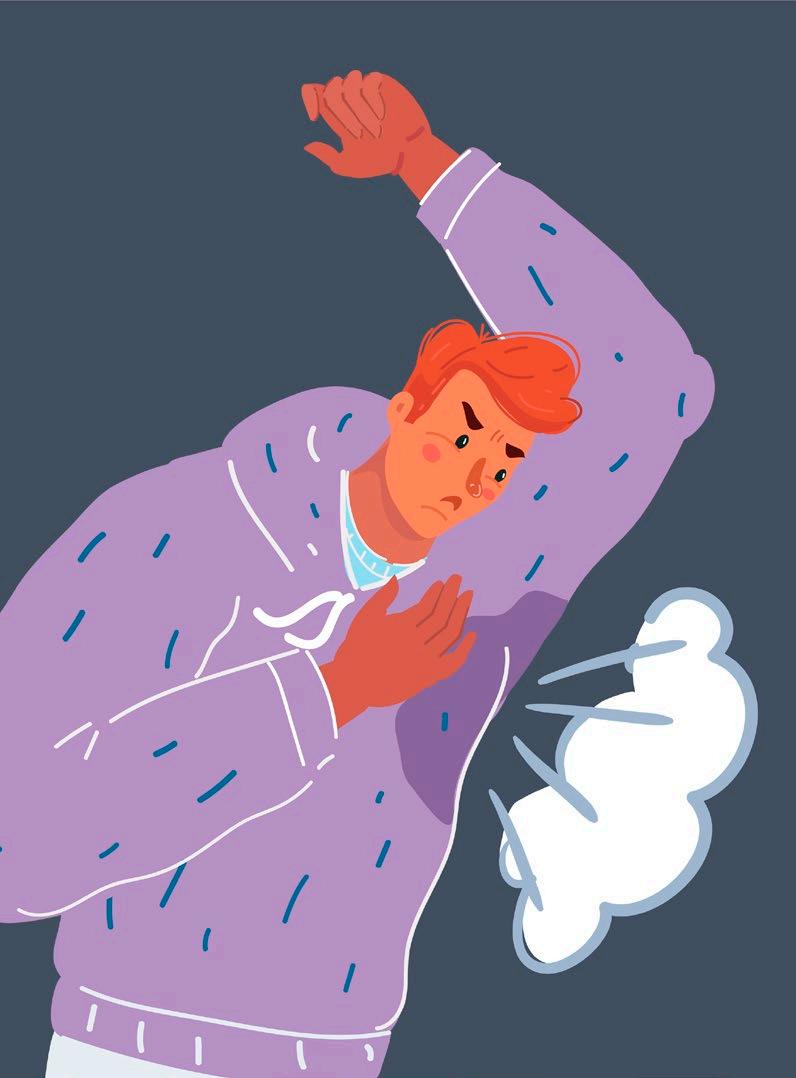
Hyperhidrosis is excessive sweating but carries a heavy, invisible burden—it’s not just damp patches and deodorants


Like Many children, I dreaded the weekly PE lessons at school.
That hour of rushed dressing and undressing with aggressive, often much fitter classmates was never something to look forward to. It was made worse by my sweating. Although I wasn’t officially diagnosed with hyperhidrosis at the time, the signs were painfully obvious. Indeed, school laid foundations for a crippling low self-worth that persists to this day.
But I’m not alone. It’s estimated that at least one to three per cent of the UK population suffer with some form of hyperhidrosis, a condition that causes excessive, sometimes uncontrollable sweating. The majority of people with the condition
experience localised hyperhidrosis, finding it in specific areas such as their hands, armpits and feet. Others, like me, find there’s not a place on their body that goes unaffected. This is known as generalised hyperhidrosis and is much harder to treat—if possible at all.
Both varieties of the condition can cause considerable embarrassment, even shame for some. Aidan from Liverpool, who developed heavy sweating at age 13 and is now in his early twenties told me, “It makes me anxious that it’s noticeable, and selfconscious that people are looking or talking about it.”
The physical effects are obvious, but it’s how damp patches and clammy handshakes affect the mental health of hyperhidrosis patients which needs more attention.
For one business owner, 32-yearold Kay*, who suffers from palmar hyperhidrosis (affecting the hands), their livelihood was directly affected. “It made me very self-conscious… I was meeting clients and I was
always nervous to shake their hands. It got to the point where I would ensure my hands were fully dry before the meeting.”
This experience highlights a deep problem with the perception of sweating, particularly at times of stress or intense pressure. We’ve all seen film and television comedies which exaggerate sweat to make us laugh, like the scene from Airplane! where Robert Hayes has torrents of water pouring down him. This scene has become a popular meme with the scene evoking expressions of tension on social media.
Such casual representation has made it difficult to see sweat as anything but a joke. But for some people, these moments are real and desperately difficult to manage. Says Aidan, “It’s incredibly frustrating at times. I’ve resorted to folding tissues and trying to use them to absorb the sweat, shaving my arms, trying
different diets… but nothing really seems to help”.
Treatment for hyperhidrosis is known to be more effective for people whose condition is focused in specific areas. Antiperspirants, Botox injections and electric therapy known as iontophoresis can halt excessive sweat in particular places. But as one GP, Dr Gerald Jones*, told me, “Patients with the condition all over will sometimes struggle to find a treatment which helps them.” Indeed, knowing this fact only adds to the sense of frustration and hopelessness for those experiencing it.
One of the biggest barriers to treatment and acceptance of the condition is the wider culture of embarrassment about sweating. Maria Thomas, founder of the awardwinning blog My Life as a Puddle, told me, “Many physicians brush off hyperhidrosis as an anxiety problem, or tell their younger patients that they will eventually outgrow it. The health care community needs to understand that we are not sweating because we’re nervous, we’re nervous because we’re sweating.”
This difficulty in seeking help for managing the condition extends further than just medical care. Sufferers often feel hopeless and trapped by their sweat patches, unable to see how their lives will ever get better. Maria explained to me how tackling this difficult

philosophy is vital to self-acceptance. “The important thing is to never give up hope while also being detached from the outcome of finding a cure or a treatment option that works for you. If you base your happiness or productivity in life on whether or not you sweat, you’ll consistently be disappointed.”
As with many chronic conditions, this positivity can feel very hard to find. Young people who have been diagnosed with hyperhidrosis are at particular risk of suffering mental health problems as a result of their condition. Anxiety, depression and
even paranoia from the appearance of damp patches is a sad reality.
Clive* told me how the condition crippled him, leaving him feeling suicidal and angry from his diagnosis at 17. Now 37, his loved ones and coping mechanisms have helped him to manage his symptoms.
Another young man, 25-year-old Londoner Connor, told me that realising his sweating was a genuine problem took time and assistance from others. “I never really thought about it until I did some research and found out I had the condition. It never occurred to me before then that I had it.” Connor's localised

version of hyperhidrosis has been successfully treated with Botox injections, though he says, “I am aware that most people who suffer with it do not get treatment and I’m lucky to have had it.”
If young people with hyperhidrosis are unaware, embarrassed and suffering mental health problems as a result of their sweat, how can they get better? Dr Shamali Hoque, consultant dermatologist for HCA, explains, “Hyperhidrosis patients can have a very poor quality of life if treatments are not offered at an early stage… It is really important for
WE'RE NOT SWEATING BECAUSE WE'RE NERVOUS, WE'RE NERVOUS BECAUSE WE'RE SWEATING
hyperhidrosis patients to seek professional advice early.”
But as the condition affects every corner of a person’s daily existence, it’s hard to feel like any treatment or medical approach will help. In our social lives, having close support and understanding from loved ones is crucial for developing that confidence. Family, friends and partners have big role to play in helping sweat-stricken relatives to manage their condition. As Aidan explains, “my friends make me feel very comfortable and it really helps going out with them.”
Another sufferer, 29-year-old Simone, explained that, “My thoughts were mostly based on the idea that I wouldn’t be able to be too close to people. I’m still pretty social, as well as outspoken about my condition. I just don’t like to be touched. I find that I’m usually the only person bothered by it.”
Simone hits on the real difficulty of hyperhidrosis sufferers to perceive whether others notice or care about
their sweat. In public spaces, a passing glance may seem like a stare to someone whose sweat is dripping down through a shopping centre. It establishes a mental barrier to regular living but also a repressive, regular physical routine of washing, cleaning and mopping up sweat.
Dr Hoque explains, “There is a lot of social stigma associated with this condition and it can exacerbate stress, which in turn causes further sweating, thus creating a vicious cycle.”
When hyperhidrosis causes a dense block of anxiety, personal contact can become difficult, especially for those more intimate moments.
I asked Maria Thomas, who first noticed her own hyperhidrosis symptoms at age 12, how those suffering can handle worries when it comes to their sex lives. “Everyone has something they’re dealing with… If you can’t be open and honest with your sexual partner, then you should probably find a new partner! Sweaty people deserve love, too. It’s OK to make a few modifications in the bedroom if that will help yourself to feel comfortable.”

Because hyperhidrosis is often undiagnosed and embarrassing for its sufferers, medical clinicians have struggled to find an effective way of building wider awareness of the condition. But in 2019, health researchers from De Montfort University in Leicester carried out a survey of patients with the condition, with the sole purpose of improving treatment policy and raising the profile of the condition. The team leader Dr Louise Dunford wrote at the time, “Despite it being a common skin condition, hyperhidrosis is not widely known about, and research is

very poorly funded. Raising awareness is key if people are to feel comfortable enough to come forward.”
Through speaking to those with the condition, the researchers pushed forward the awareness of hyperhidrosis from a relatively unknown problem to the muchimproved clinical pathway that has now been developed. But more can always be done.
Estimations of the number of people who are currently living with hyperhidrosis are vague; the
condition is not well-reported enough to make an accurate record. Dr Hoque says, “There is no doubt that there is a strong link between skin conditions and mental health… This is often underestimated and not addressed.”
Addressing a problem is half the task. It takes enormous courage from sweat boxes like me to be confident in their lives. To live without shame and feel unburdened. We’re sweaty but we really can’t help it. With better empathy, and just a few blasts of talcum powder, perhaps our sense of reality need not be so futile. n

We hear endlessly how good exercise is for our health, but you might be surprised to know just how good YOU’VE GOT TO MOVE

Susannah Hickling is twice winner of the Guild of Health Writers Best Consumer Magazine Health Feature
There, we thought that would catch your attention! In fact, research suggests that getting physical outside the bedroom for 20 minutes a day could lead to you getting more physical inside it. One study found that 20 minutes of cycling increased women’s sexual arousal by a spectacular 169 per cent. Hormones released during exercise seem to make women feel more sexy. Men benefit from physical activity too. But be careful; one study from the University of North Carolina suggested that men who exercise too strenuously may suffer from lower libido. As well as biking, good options include running,
brisk walking, strength training, dancing and even digging the garden or mopping the floor.
The World Health Organisation anticipates that the number of people with dementia will triple in the next 30 years. But regular exercise could save you from being a dementia statistic. Research is increasingly showing that staying active boosts cognitive function. Alzheimer’s Society reports that the combined results of 11 studies indicated that regular exercise from middle age could cut your risk of dementia by 30 per cent. In older people, studies suggest that physical activity results in less brain shrinkage.
Frequent exercise improves the volume of oxygen you can use in your body. This is what makes you fit and the benefits aren’t confined to sport—you’ll keep up with the grandchildren better, for example. Increased muscle tone helps too. Pilates can build core strength and improve posture, and so tone breathing muscles.
Doing something active releases “happy” brain chemicals, such as endorphins and serotonin, that make you more positive. The more you do
it, the better you’ll feel. But you do need to work up a bit of a sweat. If you’ve had a bad day, a little bit of exercise—a quick power walk or beating your rugs—is a brilliant stress reliever.
The way your gut feels often impacts on your mental and physical health. Beat the bloat with cardiovascular exercise as well as good nutrition. Walking, running and yoga strengthen abdominal muscles, increase heart rate and encourage your muscles to move digestive waste through your body more efficiently and digest food more quickly.
There may not be an elixir of youth just yet, but keeping fit comes close. Just 15 minutes of exercise a day for eight years can increase your lifespan by three years. The more you do, the longer you could live, according to a study from Harvard Medical School. It seems that physical activity delays cell ageing and reduces inflammation, which benefits heart and arterial health. It can be lowintensity exercise—swimming, a gentle exercise, a long walk on a treadmill at the gym, or a lowintensity YouTube workout. n
For more weekly health tips and stories, sign up to our newsletter at readersdigest.co.uk

A new study shows that 3,500 fewer people were diagnosed with bowel cancer last year, possibly linked with people’s reluctance to go to doctors for fear of catching COVID-19. But early diagnosis is key to survival
this test, if blood is identified in the sample you send, you are asked to undergo further investigation.
Whatever your age, it’s crucial that you look out for the tell-tale signs of bowel cancer and get in touch with your GP straightaway if you’re concerned. The main symptoms are bleeding from your bottom when you poo or blood in your faeces. But don’t ignore other persistent and unusual changes, like going to the loo more often or feeling as if you haven’t finished emptying your bowels. Weight loss, fatigue and a pain or lump in your tummy are other possible symptoms.
However, these symptoms could all point to other, non-malignant conditions, including constipation, irritable bowel syndrome, piles or diverticular disease.
There are proven ways to lower your risk of bowel cancer. Around 11 per cent of cases are linked to being overweight. Take action to shift extra kilos if your BMI is above 25 and do at least 30 minutes of exercise five days a week. Limit red and processed meat, as they up your risk, and eat more fibre. Alcohol consumption is behind six per cent of bowel cancers and smoking is linked to seven per cent of cases, with risk increasing the more cigarettes you puff on. So restrict your drinking to 14 units a week and have at least two alcohol-free days. If you smoke, take steps to stop. n You should always take advantage of screening when it’s offered. Everyone aged 60 to 74 and from age 50 in Scotland is sent a home poo-testing kit. This aims to detect cancer at an early stage before symptoms appear. But there are changes to the screening programme—bowel scope screening (a mini-endoscopy) at age 55 has been stopped. Instead, the plan is to extend home testing in England to everyone over 50. With
Dr Paul McKay is a researcher at Imperial College and member of Team Halo
How did you become a vaccines expert? My PhD over 30 years ago was in immunology and molecular biology. Since then I have been working mostly in HIV vaccine development, but when the COVID pandemic started, I was able to switch the target of my vaccine to the coronavirus spike protein, which is how the virus gets into the cells.
How do vaccines work? To make the immune system fight against something, we want to give it the thing it needs to fight against. The COVID vaccine makes an artificial spike protein in our cells, which recognise it as not being our body and react against it.
Why should people be vaccinated? The percentage of people who get very sick with COVID and go to hospital is really high. In the overseventies, it’s about one in five. The vaccine protects you from getting ill

Dr Paul McKay is a researcher at Imperial College and a member of Team Halo, which tackles vaccine misinformation on video-sharing platform TikTok
and reduces the effects if you do. Even if you don’t get very ill, COVID can have serious long-term side effects, affecting your lungs, kidneys, liver, brain or heart. Getting vaccinated also protects vulnerable people who can’t—for example, people undergoing cancer treatment.
Can vaccines make you ill or have long-term harmful effects?
Vaccines can give you a sore arm, headache, or slight fever. Vaccines are one of the safest medical interventions and long-term harmful effects are extremely rare. In comparison, long-term harmful effects of the diseases we vaccinate against are not rare.
How do we know the COVID jab is safe, given that it was developed in a short time? The scientists behind the Oxford vaccine had been working on it for 15 years. It was used for another respiratory virus, MERS, and has an excellent safety profile. mRNA—used in the Pfizer vaccine—is used in a drug licensed in 2018 and there have been no safety issues whatsoever. An mRNA vaccine for rabies was first put into people in 2013. n
Visit teamhalo.org for more information
This month, an encounter with a former serviceman gets Dr Max thinking
George had been happiest in the army. Looking at him now, sitting hunched up, speaking in almost inaudible whispers and barely making eye contact, it was difficult to believe that he had ever been happy. I looked around his room as I talked to him in the hostel where he was staying. He sat in an old armchair and picked at the foam that was protruding through the armrests where the covering had worn away. I sat on the thin, bare mattress on his bed; the springs creaking as I tried to get comfortable.

Max is a hospital doctor, author and columnist. He currently works full time in mental health for the NHS. His new book, The Marvellous Adventure of Being Human, is out now
George lit a cigarette and continued to tell me how he had ended up on the streets. He hadn’t liked school and had left at the age of 16 with only a couple of O levels. After this he had spent several months helping his older brother clean carpets. He drifted aimlessly until, a year later, he and a friend had decided to sign up. Suddenly, his life had purpose. He had loved the discipline and routine and went on campaigns all over the world. When he’d left to return to civilian life, though, things had never worked out for him. There had been no big event, no hideous trauma. He just couldn’t adjust to life on Civvy Street. He had wandered
aimlessly through life until, without work and drinking heavily, he found himself homeless and had slept rough until he got a room at the hostel a few weeks before I met him. I was doing an outreach project at the time, working with homeless and vulnerably housed people and his story was nothing new to me. Ex-servicemen make up about a quarter of homeless people in the UK. It seemed that most had been so used to the discipline of military life that when this was taken away they were left dazed and confused, bereft of any sense of belonging. Research suggests over 2000 ex-servicemen are in prison.
do precisely as you were told—in essence, to be institutionalised. Others I met were haunted by the things they had witnessed and dogged by depression or PTSD. Some turned to alcohol or illicit drugs to anaesthetise themselves. Some turned to crime, others to suicide. Poor specialist mental health provision for those who have witnessed traumatic events while serving their country means that many veterans are left battling severe mental illness and behavioural problems.
OVER
Having witnessed the way that exservicemen’s lives can unravel once they leave the forces it comes as no surprise to me that some find themselves in trouble with the law. Perhaps some would have ended up like this even if they hadn’t joined the forces and the army provides people like George with brief respite. But as I sat and listened to how he’d found himself in a quagmire of despair and loneliness, I wondered how you could be expected to cope in the real world if, from the age of 16, everything had been so rigidly controlled: you were trained to obey orders, to
The fact that those who end up in prison tend to have committed violent crimes suggests that the way in which service personnel are being prepared for civilian life is grossly inadequate. It is, after all, unsurprising that a cohort of people who have spent years being trained in effective combat can suddenly switch to a different set of social mores, especially when they are having to contend with mental illness. Is rehabilitation not what’s needed here, rather than punishment? That’s not to excuse their behaviour or absolve them from responsibility for their actions. But I can’t help but think that we, as the people they have protected, must take some responsibility for their situation as well. n
Q: I have always wanted to give blood but I find the rules so confusing, they seem to change every time I look! I have eczema and asthma—am I allowed to donate? My son says he cannot donate because he is gay, which I don’t understand. With all these barriers it feels like they are trying to put us off! Should I just give up? -Fiona
A: Thanks so much for your letter and firstly, please don’t give up! We urgently need more blood and it would be awful if you gave up just because the rules can seem a bit confusing. Remember, every bag of blood used comes from someone who has donated—there’s no other way of getting this vital resource. We’re lucky in this country to have a brilliant NHS blood donation service who will be more than happy to help and answer any questions you have. I’d encourage you and anyone else who is interested to have a look at their website: blood.co.uk or give them a call on 0300 123 23 23. Most people can give blood. You have to be fit and healthy and weigh

between 7 stone 12lbs and 25 stone. There are some age restrictions—you have to be between 17 and 66, or 70 if you have given blood before. If you are over 70 you have to have given a full blood donation in the last two years. There are also restrictions for people with health conditions, including asthma. Taking inhalers doesn’t prevent you giving blood. You need to wait six months before giving blood if you’ve received steroid tablets or injections for more than three weeks. If you’ve needed them for more than six months, then you have to wait a year before donating. Gay men can donate but only if it has been three months or longer than the last sexual contact with another man. This winter the NHS is facing extra challenges to provide hospitals with blood, plasma and platelets (the latter two are taken from the blood people donate). The pandemic means they need donors more than ever. So please, do donate if you can! n
Got a health question for our doctor? Email it confidentially to askdrmax @readersdigest.co.uk










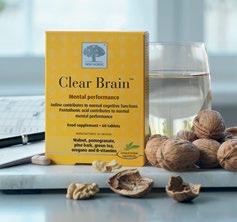
Your imagination lets you travel in time and space, says memory expert Jonathan Hancock
My last foreign journey before lockdown was to Singapore—a place I’d visited once before, nearly 30 years previously. This time, I spotted the hotel I’d stayed in on my first trip, stepped into the foyer for a quick look… and was shocked by how many memories came flooding back.
Some things had changed, of course. But I was astonished at just how much I recognised.
Even more amazing was how much the place made me remember. Suddenly I was the “me” from 30 years ago. The layout, the décor, the smell… they were all working together to take me back in time, in rich detail, and with a powerful emotional kick.
Buildings often have this remarkable power to trigger our recall. On a scientific level, it’s all about context. What you remember is linked strongly to where you were at the time. So, returning to that physical space helps to bring it back to mind, especially with all the sense “triggers” there to help.
That’s why it can be so difficult to
remember something you’ve learned in one place when you’re somewhere else. In an exam hall, for example, it’s harder to recall information than in the room where you revised.
But it’s not all about location. Emotional context is equally important. When you revisit somewhere and it reminds you of how you felt in the past, those familiar feelings can bring everything else back.
You don’t even have to return physically. You can go there in your imagination and still enjoy reconnecting with your past (in exams, I used to “imagine” myself back into my bedroom!).
Try it now. Pick a building you feel nostalgic about, and imagine standing there, looking around. If a particular detail comes to mind, focus on it for a moment, in case it starts a chain reaction of recall. What can you hear, smell, touch or taste there, too?
Most importantly, zone into your feelings about “being” in this space. You’ll create a powerful mental loop: the physical details awaken your feelings, and those feelings bring back more and more details about your past.
Start seizing every opportunity you get to revisit meaningful buildings, either for real or in your imagination. It’s a great way to keep your recall alive and your confidence high. And I bet you’ll be surprised by just how many memories fall back into place! n
What could be more special than your life in your words? Told with the help of LifeBook, the world’s leading memoir and autobiography service. Around the world more than 8000 people already enjoy owning the life story of someone they love. Each book is a unique piece of family treasure, custom-made and handcrafted, to be shared by generations to come. It’s time to tell your story.
Find out how by calling us on 0800 999 2280 or at lifebookuk.com
These 12 folk treatments are proven to work by The Editors

Many of us fall back on home treatments for ailments, whether they’re proven to be effective or not. We asked editors at Reader’s Digest (RD) editions around the world to share those that work for them—and then we checked out which ones are backed by research. Here are our favourites.
French folklore has it that during the 17th-century plague, a gang of four thieves would rob corpses, yet never catch the plague themselves. Supposedly, anointing their bodies with a concoction of vinegar and herbs protected them.
The so-called vinaigre des quatre voleurs (four thieves’ vinegar) is used today in the belief it fights infection. Many of the ingredients steeped in it—garlic, rosemary, sage, lavender, thyme, juniper berry, black pepper and more—are proven to have antibacterial properties.
“I know people who consume this regularly as an antibacterial,” says Stéphane Calmeyn, Paris-based editor of RD. He adds that a friend of his with Type 2 diabetes credits it with helping regulate his blood sugar.
Though more research is needed, there is evidence that vinegar, particularly apple cider vinegar, can
affect blood sugar levels: it delays the rate at which the stomach empties and starch is digested, which reduces the blood-sugar spike after a meal. But check with your doctor before adding it to your diet, particularly if you are also taking blood-sugarlowering medications.
Apple cider vinegar may also prevent overeating. A small Swedish study found that those who consumed vinegar with a meal reported feeling more satiated than those who didn’t consume vinegar. That could prevent unhealthy snacking later in the evening.
It’s best not to drink undiluted vinegar, as its acidity could damage tooth enamel. Instead, add one or two teaspoons to water or tea.
Aids Digestive Health
When her husband got food poisoning while traveling in Malaysia in 2017, editor Bonnie Munday heeded a recommendation for a local remedy.
“We didn’t have any medicine for tummy troubles, but our hotel manager advised eating ripe papaya,” says Bonnie, who is on RD’s International Edition team and is based in Toronto. She was skeptical but bought some of the fruit from a beach vendor. “An hour or two after my husband ate it, he felt so much better.”
A study from Obafemi Awolowo University in Nigeria published in
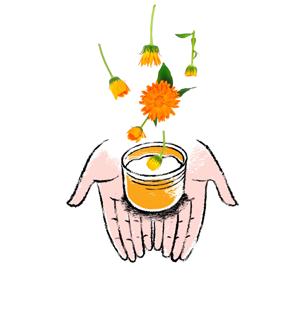
the Journal of Medicinal Food found that papaya, an orangefleshed fruit that grows in the tropics, fights intestinal parasites. When researchers gave a papaya seed preparation to children who tested positive for intestinal parasites, it was shown to be anti-helminthic (capable of eliminating parasitic worms) and anti-amoebic (capable of destroying or suppressing amoebas); it treated their parasites without harmful side effects.
And results of a double-blind placebo-controlled trial that were published in the journal Neuroendocrinology Letters in 2013 showed that volunteers with digestive complaints like bloating and constipation had significant improvements after ingesting a papaya pulp supplement called Caricol. Papaya is also rich in vitamin C, and high in water and fibre content, which regulates bowel activity. “Ever since that time in Malaysia,” says Bonnie, “if we see papaya at the store, we buy it, just for overall digestive health.”
Calms Inflammation
“Many people in Germany consider calendula a miracle cure, and have their own recipe for a balm,” says Annemarie Schäfer, who works on
the RD team in Stuttgart. Her cousin Marlen, a teacher, recalls that when her mother grew calendula—also called marigolds—in her garden, she’d mix their orange and yellow heads with warm pork fat (you can also use petroleum jelly, beeswax, or olive oil). After a day of steeping, the mixture was strained and jarred, to be used on rough hands, insect bites, acne, and other skin irritations.
High levels of antioxidants in the dried petals reduce the damage caused by free radicals. Research has shown the flowers contain antiinflammatory and antimicrobial components that prevent infection and heal wounds by helping form new blood vessels and tissue. In patients with venous leg ulcers treated with either calendula ointment or saline solution dressings, calendula helped ulcers heal much faster.
Relieves Sore Throat liquorice-based candy, called dropjes, are as Dutch as wooden shoes—but while few farmers still wear wooden shoes, everybody eats dropjes. “It’s a sort of national pride,” says editor Paul Robert in Amsterdam. “And you can get them everywhere—supermarkets, newsstands, pharmacies. They come

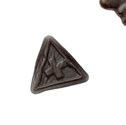
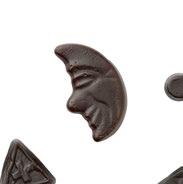


in all shades of brown and black with flavours ranging from very sweet to very salty.”
Besides being somewhat of an addiction for the Dutch, it’s widely known in northern European countries that liquorice also serves a medicinal purpose: sore-throat relief. Indeed, a 2013 randomised, double-blind study of 236 people by the Medical University of Vienna found that patients who gargled a liquorice solution before going into surgery requiring throat intubation had a lower risk of sore throat after the surgery.
The extract of the liquorice root, Glycyrrhizin, tastes sweeter than sugar, despite having a zero glycaemic index. But it’s not safe to consume more than 100 milligrams per day, as it can dangerously reduce blood potassium levels (a cup of liquorice tea contains roughly 30 milligrams, according to The British Medical Journal).
“When I was a child,” says Paul, “the best thing about having a cold was that I’d get lots of dropjes. Sucking on them soothed my throat back then, and still does now.”
Dropjes are an acquired taste, especially the salty ones. “Once,” he
recalls with a laugh, “I gave them to an American friend, who told me they tasted just as terrible as the raw herring and smoked eel that I’d given her earlier!”
Gets Rid of Warts, Corns, Calluses
“We use a lot of garlic in our cuisine,” says editor Mario Costa in Lisbon. “But some people, especially in rural areas, also use it to get rid of warts, corns, and calluses.”
Corns and calluses both involve a buildup of skin at pressure points on the foot, while warts are small growths that can occur anywhere on the body and are caused by the human papillomavirus, or HPV.
Research from 2005 published in the International Journal of Dermatology showed that warts treated daily with a garlic extract disappeared for all the study subjects within two weeks, and corns disappeared for 80 per cent of subjects after three weeks.
Garlic has antibacterial properties (thanks to its main component, allicin) and its antiviral effect may attack the virus that causes warts. Be careful not to allow raw garlic to touch healthy skin as it can cause irritation and damage similar to a burn.
It worked for RD reader Georgina of central Portugal. Here’s what she told us on Facebook: “A few years ago, when my friend’s aunt noticed me limping because of a callus, she told
me about this home remedy. I baked a few garlic cloves, crushed them, and applied the pulp to the callus, avoiding healthy skin. I covered it with gauze and changed this compress daily. Although the smell was a little intense, after five days, my callus disappeared.”
Soothes Skin
“We use a balm containing St John’s wort to promote wound healing and soothe skin,” says editor Maja Lihtenvalner in Ljubljana. St John’s wort is a plant with yellow flowers that’s native to Europe, northern Africa, and southwestern Asia.
She describes how her friend Neven, a consultant and olive oil producer in his fifties, remembers his grandmother always having the remedy in her kitchen. “Neven would spend summer vacations at her house on the Adriatic Sea, and often got sunburned. His granny would apply a mixture of St John’s wort and olive oil to his painful skin.” She also used it on bruises and insect bites. “He says it was always a relief.”
Animal studies out of Turkey in the past few years have shown that St John’s wort promotes wound healing and also relieves burns; rats treated topically with St John’s wort four times a day experienced more rapid healing than those
in the other groups.
And a 2010 Iranian randomised, double-blind clinical trial of 144 women published in the Journal of Alternative and Complementary Medicine showed that women who had undergone caesarean sections and applied a St John’s wort ointment three times a day for 16 days had improved wound healing and less pain and scarring than those in the placebo and control groups.
Ingesting St John’s wort can also treat mild to moderate depression, and menopause symptoms such as hot flashes. But speak to your doctor before taking it, because it can cause serious side effects and drug interactions.
Arnica is popular in Mexico, says RD editor Luis Eduardo Pineda Rosales in Mexico City. “I played basketball when I was a kid, and sometimes my fingers would get painfully bruised. My mother would rub them with arnica balm, and in a few days the bruising would be gone.” These days, Luis uses it for sore muscles. “I keep arnica balm in my first-aid kit.”

Anti-inflammatory arnica, from the same family as asters and daisies, is said to reduce swelling and bruising. A 2013 review of 174 people with hand arthritis found that arnica gel reduced pain and


improved function in the hand as effectively as an ibuprofen gel. As arnica can be poisonous, it should not be taken by mouth.
Luis has another go-to: aloe vera, or sábila. A review of four studies from Asia, published in the journal Burns, concluded that aloe mucilage (the gel inside its leaves) and some aloe products can accelerate healing of minor burns several days faster than conventional medication. “Not long ago, I accidentally grabbed the handle of a hot pan,” recalls Luis. “Luckily I keep sábila in a flowerpot on my patio, so I got relief quickly.”
“When we were kids, if we had a cough my grandmother would whip one egg yolk with sugar and, when it had whitened, combine the mixture with a cup of macela [also spelled marcela] tea,” says Tanara Vieira, a designer for Reader’s Digest from Rio Grande do Sul. “It tasted so good that my sister, my cousins and I used to pretend we were coughing so she would give it to us.”
Across Brazil, plants have long been used medicinally. A review of several studies published in 2014 in the Brazilian Journal of Pharmacognosy sought to show whether a variety of
plants of the southern Rio Grande region offers the health benefits they are purported to. The review showed that indeed, in several pre-clinical studies, there’s evidence Tanara’s grandmother was right: macela (Achyrocline satureoides), which is a plant in the daisy family, appears to be antispasmodic, helping relieve a cough. It’s also muscle-relaxing, anti-inflammatory, and analgesic.
We need earwax because it keeps the skin inside the ear moisturised and helps prevent dirt and bacteria from reaching the inner ear. But a buildup of too much wax can form a plug, contributing to hearing loss, ringing in the ears, or dizziness. Plugs, called cerumenosis, can happen if you use cotton swabs, which push wax in, or if you’re naturally prone to the buildup. It can happen especially in elderly people or those who wear hearing aids.
People in many parts of the world find that a little warm oil, such as almond or olive, can soften the wax, unplugging the ear canal. Natalia Alonso, Madrid-based Reader’s Digest editor, says her sister-in-law, Carmen, goes to her doctor to get built-up earwax removed, but she sometimes treats it herself.
“On a recent beach holiday in Galicia, she noticed her hearing
had diminished, and knew what the problem was,” says Natalia. “So she dipped a cotton swab in warm olive oil and let a little drip into her ear, and soon the clog disappeared.”
A University of Southampton review of 26 clinical trials found that earwax softeners are effective, and that side effects are rare. Nevertheless, it’s recommended you check with your doctor before attempting selftreatment of ear issues.
For centuries the Maori community of New Zealand has relied on the bark and leaves of the manuka bush— native to New Zealand and sometimes called a tea tree—for its health-giving properties. More recently, the honey made from its white or pink flowers is the star: research shows this type of honey has much higher levels of antibacterial and wound-healing compounds than others.
“Our whole family uses manuka honey,” says Auckland-based Yulia McKenzie, who works in advertising with the New Zealand edition’s RD team. She says it’s a great-tasting way to keep the immune system healthy. “We use it on waffles and cereal, and as a sugar substitute for smoothies.” In winter months, Yulia’s family uses the honey to soothe sore throats and coughs.
Research from Cardiff University
showed that components of manuka honey can stimulate immune cells, increasing our ability to fight bacteria (it’s especially effective against a strain of streptococcus). Another study showed its antimutagenic, antioxidant, and anti-inflammatory qualities may even help prevent or treat cancer.
One small study showed that manuka honey may improve dental health. Subjects given a chewable form of the honey had a 34 per cent reduction in plaque, and a similar reduction in bleeding for those with gingivitis, compared with study participants directed to chew sugarless gum. Some people use this honey as a facial mask to soften and brighten their skin. Says Julia, “I use it regularly, and I must say my skin looks amazing!”
Check the label to make sure it’s genuine manuka honey from New Zealand. Labels also carry a UMF (Unique Manuka Factor) grade up to 26; the higher the number, the more healthful compounds it contains.
Clears Sinuses
Adele Burley uses eucalyptus oil to alleviate cold symptoms like nasal congestion. “It helps clear the airways,” says the Sydney-based senior art designer for RD Australia. “I add a few drops to a bowl of steaming water, cover my head with

a towel, and breathe in.” In a randomised double-blind trial of 152 people, published in The Laryngoscope in 2009, German researchers found that the main component of eucalyptus oil—1,8cineole, or eucalyptol—was effective and safe for treating sinusitis, helping clear nasal blockages and mucus.
The eucalyptus tree is native to Australia, and the oil from its leaves is similarly helpful if you have perennial allergic rhinitis—a chronically stuffy or runny nose due to pet dander, mold, or dust. A South Korean study published in 2016 in Evidence-Based Complementary and Alternative Medicine found that essential oils including 1,8-cineole alleviated symptoms. Of 54 people aged 20 to 60, those who inhaled the oils for five minutes twice daily over seven days also had better sleep versus those who inhaled a placebo.
Don’t ingest eucalyptus oil, though, and avoid applying it directly to your skin; if it’s undiluted it could cause irritation.
“The steam sauna has been a Finnish tradition for hundreds of years, and most Finns go regularly,” says Ilkka Virtanen, Helsinki-based editor of Reader's Digest. A sauna is typically a room heated to between 80 degrees and 100 degrees Celsius. When a person sits sweating in a sauna, their heart rate increases, as does blood flow in the skin, boosting circulation as much as low to moderate exercise does. Risk of heart attack and stroke are reduced, according to a 2015 study of Finnish men published in JAMA Internal Medicine. That research also showed that sitting in a sauna two to three times a week lowers the risk of dying from any cause by 24 per cent. Another study showed that 15 minutes a day in a sauna five days a week may help to ease mild depression.
If you’re new to the sauna, start with five or ten minutes; 20 minutes is the maximum. And if you have heart disease, or high or low blood pressure, speak to your doctor about whether a sauna is safe. n
In 1631, the royal printers Robert Barker and Martin Lucas mistakenly left out the word "not" in the Bible's commandment "Thou shalt not commit adultery". The edition is now know as the Wicked Bible or the Sinners' Bible
Source: theguardian.com/books/2015/oct/21/rare-sinners-bible-on-sale-bonhams-auction
Sudden bald patches can have many causes, but most can be treated
Hair loss is often begrudgingly accepted as a natural part of life. After all, most people, women included, will lose some or all of their hair as they get older. But when hair loss happens suddenly— handfuls coming out in the shower or while brushing—it can be truly distressing. It can also be a signal of a health issue that needs to be addressed as soon as possible.
To understand why unexpected hair loss happens, it’s useful to know the growth cycle of healthy hair.
Usually, most of your hair is in a growing phase, during which strands lengthen by about 1.25 centimetres a month. This part of the cycle carries on for between two and eight years.
After that, there’s a middle phase, lasting about three weeks, during which the hair isn’t getting longer but also isn’t falling out. Finally, strands enter a resting phase, where the hair is loosened but sits in its follicle. Then, when the follicle begins to grow a new hair, the old one drops out.
Due to this cyclical process, we all
lose up to 100 strands of hair each day. “At any one time, about ten per cent of our hair is in the falling out phase,” explains Jennifer Jones, a dermatologist from London, UK, and an advisor to the British Association of Dermatologists.
When that balance is disrupted, a person can have too much hair in the resting phase—and a few months later, he or she might find that a large amount comes out all at once.
DIVORCE, OR EVEN MOVING HOUSE
One of the main triggers for this disturbance is hormonal changes in the body. Estrogen keeps hair in the growth phase, while androgens shorten the growth cycle.
For this reason, giving birth and thyroid issues—both of which shift the balance more toward androgens—can cause hair loss. “Stress is also a massive trigger,” says Jones. “So, life events like divorce, bereavement, or even moving house have this effect.”
Another common culprit is autoimmune conditions, most notably alopecia. This condition, which affects two per cent of people
worldwide, runs in families and can be activated by a stressful event. In some cases, alopecia is subtle; other times, sufferers lose all their hair— including their body hair, eyebrows and eyelashes. Patches of alopecia tend to grow back, while fullbody loss is usually permanent.
Scarring from other autoimmune conditions—including eczema, psoriasis and lichen planopilaris— can lead to patches of hair loss. Similarly, ringworm, a fungal infection, can affect the part of the head that it appears on.
Some people on prescription drugs also experience a disruption of their growth cycle. For instance, hair loss is a known side effect of some bloodpressure medications, statins and hormone replacement therapy, among others. “If you notice hair loss, you should discuss it with your doctor,” says Jones. “We can often switch your medications.”
Treatment depends on the underlying cause. To discover that, a doctor might order blood tests, perform a small skin biopsy or examine the hairs under a microscope. If the loss is hormoneor stressrelated, it is usually temporary, and resolves within a few months without any intervention.
For cosmetic solutions, topical steroids can help thicken hair, and hair transplants are another option. Some people, of course, simply embrace their hair loss. n
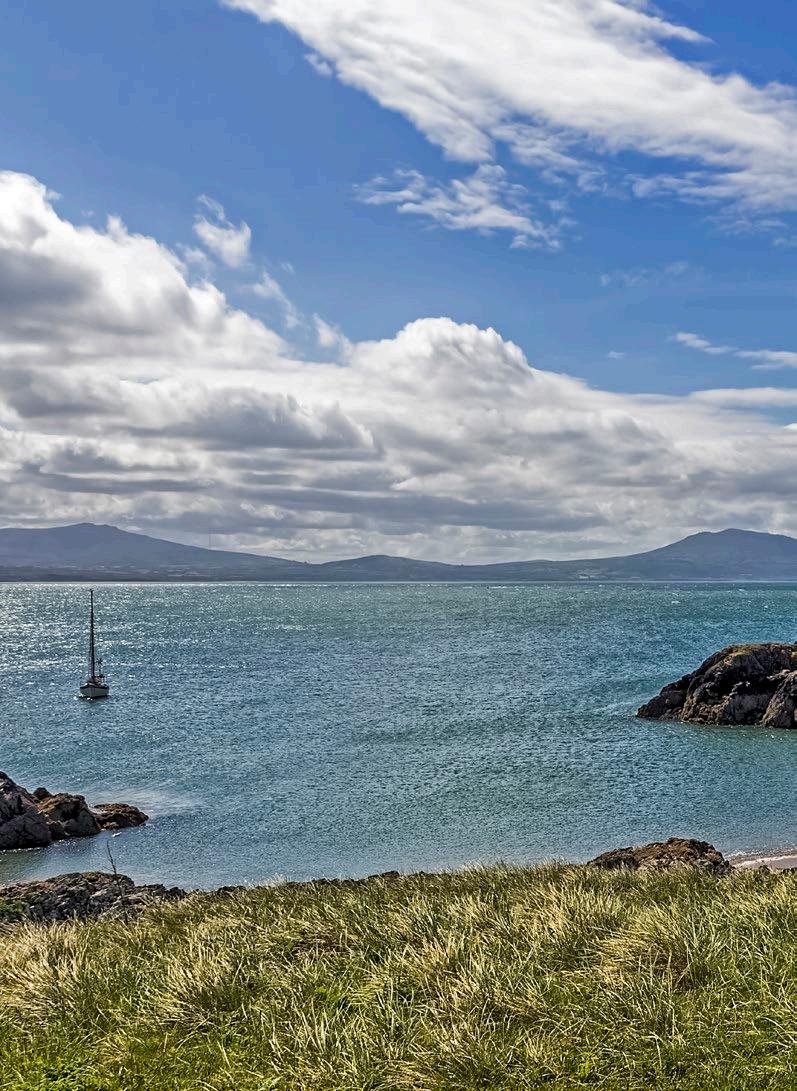
The largest of the Welsh islands, Anglesey sits just off the country's north-west coast. Such is its size, that it's only five square kilometres smaller than Singapore. Anglesey is the most populated of the British Isles after the Isle of Man, with some 70,000 residents, most of whom are native Welsh speakers. In literature, the island has something of a mythic reputation, and has been known as the Dark Isle, the Isle of the Brave, Honey Isle and Mother of Wales over the years.
The main towns on the island are Holyhead, Llangefni, Benllech, Menai Bridge, and Amlwch. Anglesey is also home to the village with the longest name in Europe—Llanfairpwllgwyngyllgogerychwyrndrobwllllantysiliogogogoch. Visitors to the island today enjoy its unspoiled beaches, ancient heritage and breathtaking sites of natural beauty.

“To be born in Wales, with music in your blood and poetry in your soul is a privilege indeed”
- Poet, Brian Harris
Alison Lea-Wilson of Halen Môn, a natural sea salt produced in Anglesey, has lived on the island for over four decades with her husband and partner, David. Visit halenmon. com for more information
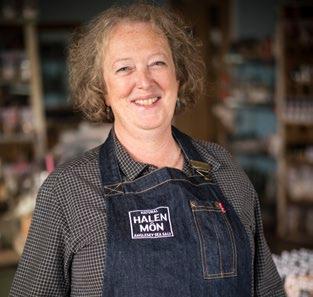
I moved to Anglesey with my husband David more than 40 years ago. For more than 30 of those, we have restored and lived in an old Georgian house with a farmhouse kitchen and a garden where we grow much of the veg we eat. We moved here all those years ago to come to Bangor University.
In our student days we used to sell wet fish in the student union to bolster our shared student grant. After graduating, having fallen in love with each other and the island of Anglesey, we started looking for ways that would allow us to continue to live and work in this area of
outstanding natural beauty. Having supplemented our meagre student grants by growing oysters, our small enterprise evolved into a wholesale fish and game business which we then ran for 12 years. We realised people were as fascinated by the fish in the sea as the fish on their plate so in 1983 we set up The Sea Zoo, which ended up becoming Wales’ largest aquarium.
When the seasonality of both these businesses became a problem, we sat down to brainstorm ideas of what we could do to make money in the winter months—we hit upon the idea of making sea salt. We knew the sea around the island was exceptionally clean as the



notoriously fussy sea horses at The Sea Zoo bred happily in it. Sea horses are very picky about the water in which they live and breed so we had a feeling that these briny waters had the potential to produce the world’s finest sea salt. In 1997, we left a saucepan of seawater to boil on the AGA in our family kitchen and as the salt crystals started to form, we knew we’d struck culinary gold.
We started supplying Halen Môn Sea Salt to Swains, our local butchers in Menai Bridge on the Isle of Anglesey and they're still customers today. Our sea salt is enjoyed around the world by chefs, food lovers and even Barack Obama. It has been served at the 2012 Olympics, political summits and royal weddings and is a vital ingredient in Green & Blacks chocolate and Piper’s crisps.

Ynys Môn is characterised by storybook coastlines, seemingly endless dunes, green, green grass, and—perhaps most importantly for us—incredibly clean seas. We have the most beautiful combination of mountain and sea views, looking out as we do over Snowdonia, separated only by a thin stretch of water called the Menai Strait. The island is peppered with so many memories of walks, picnics, boat trips and businesses, that it’s very hard to pick a favourite spot.
If pushed, I’d probably choose either Ynys Llanddwyn, an island with a pictureperfect lighthouse where we walk every Christmas day, or the beach right in front of Halen Môn—the view is never the same on any given day, and it’s the resource we have made our living from for over 40 years.
Victoria Roberts is the director of Wonderfully Wild, a luxury glamping site in Anglesey. Visit wonderfullywild. co.uk for more information

I've lived in Anglesey all my life. My three sisters and I grew up spending most of our time in the water or on the water— sailing, swimming, water skiing and windsurfing or on the beach. It was very much an outside childhood, we only went in when dinner was ready!
Everyone comes back to Anglesey eventually. We all moved away for university or jobs, but we all moved back to raise our own families here on the island. I think that speaks volumes, quality of life.
The spirit of our community is rooted in the landscape of the island. Anglesey people are adaptable and have evolved and changed as the island has. And of course we have our Welsh language that connects us and our spirit with the landscape around us. It’s a living language that we’re proud and fiercely protective of.

I love everything about Anglesey, but if I had to choose one favourite place it would be Penmon Point with its iconic lighthouse. I’ve been drawn to it since I was young, spending hours fishing off the rocks or in my dad’s boat at Puffin Island pulling in the lobster pots and watching all the nesting birds. It’s an area steeped in history and you can really feel it.
We started our glamping site, Wonderfully Wild, eight years ago as a farm diversification project and the rest as they say is history. We offer luxury glamping in safari lodges set on 15 acres of private land, each with their own facilities and some with wood fired hot tubs too.
Last year we started our rewilding project in order to turn some areas into
wildflower meadow and started a tree planting scheme too. This year’s project is adding in some further glamping units but you’ll have to wait and see what they’ll be!
Anglesey is a great destination, it has everything—amazing places to eat, great places to stay (us!), lots to do and the fresh air is free and unlimited.
To plan a future visit to Anglesey, head to visitanglesey.co.uk/en


Dr Mark Galeotti is a scholar and writer, whose career has stretched from being attached to the British Foreign Office to teaching about organised crime in Moscow
We’d introduce a “Stuff Happens” law. It seems that whenever something bad happens, the first question is, “Who is to blame?” and the second is, “What’s the compensation?” When someone really is at fault, whether it’s a business owner who sold substandard goods or a government that blundered, then of course there ought to be an apology, prompt measures to put things right, and, if appropriate, some kind of recompense. But sometimes, “stuff happens” and it shouldn’t be so hard to prove that no one actually did wrong. It’s infantilising, it’s counterproductive, and it’s just plain stupid.
There would be more uniforms. In late tsarist Russia, everyone from librarians to lawyers had official, military-style uniforms, with the appropriate garnish of braid and shiny buttons as you rose through your profession. Postmen even got a sword!
I think that sounds like a fine idea. I wouldn’t expect people to wear them every day, but it would make weddings, funerals and office parties much more glittering spectacles and save people like me from worrying they are ever going to be over- or under-dressed for an event.
I’d make politicians do work experience. Most democracies now have a political class that to a considerable extent is made up of people who pretty much decided on this trajectory at university. Too many may have dabbled in politics-friendly careers such as the law, PR or finance—depending on which side of the aisle they are on—but essentially are professional politicians. Yet politics would be enriched by more people with practical experiences of the issues which they are debating and deciding: not just doctors and surgeons, but nurses and midwives to weigh in on health issues; police,
prison and probation officers who spent time at the sharp end of the criminal justice system; market traders’ and shopkeepers’ perspectives on the economy. To this end, every newly-elected parliamentarian should spend three of their first four summer recesses in work experience, getting a taste of a different career each time.
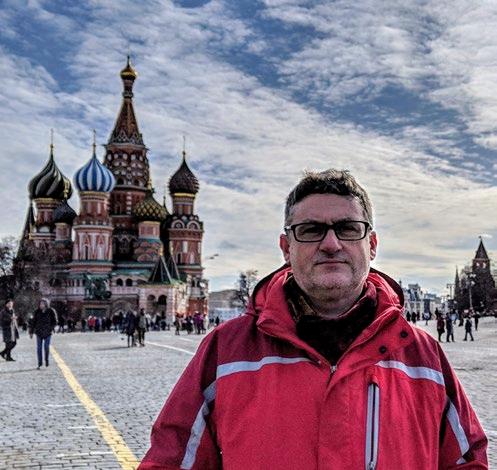
Dogs would be given their due. Of course, my most urgent act would be to give proper recognition to dogs, as examples of the kind of unstinting love and unhesitating companionship to which we all should aspire.
Gurbanguly Berdimuhamedov, dictator of Turkmenistan, is a man who has decreed that all black cars should be painted white or silver and made his cabinet applaud him for his weight-lifting, but erecting a six-metre statue of a dog in his capital is one of the less barking mad of his decisions. We could do with more dog statues.
I’d make time for online etiquette. The online world can be tremendously enriching but it can also be a sea of vitriol, bile and spleen, a virtual haven for casual insults, open prejudice and naked aggression. It’s time for some online manners. Out go anonymous accounts, that
make it too easy for people to say the most terrible things, secure behind their “handle.” It’s not a denial of your right to free speech if someone else blocks you (any more than if someone chooses not to stand there if you are insulting them to their face).
There would be grammar police. It’s time we pedants had a paramilitary arm. Next time someone sneers about the “grammar police” when they insist on making a plural with an apostrophe, or confuses its, it’s and its’, then in they should storm, correction fluid in one fist, handcuffs in the other, ready to drag the offender off to reformatory, the “Grammar Gulag.”n
A Short History of Russia by Mark Galeotti (Ebury Press, £12.99) is out now
Books are valuable for so much more than simply reading, they're for sharing, escaping, learning and growing. For many of us, they are a form of therapy. But for key workers operating in the UK during the pandemic
they have been lifelines. Here, coronavirus front-liners reveal what reading means to them right now, how books helped them cope, and most importantly, which books have been on their reading list.



I have been running the prison’s COVID-19 symptomatic isolation unit. This means anyone who shows symptoms, has been in contact with a confirmed case or is new to the jail must live on my unit for 14 days in total quarantine. The PPE shortage in March meant that I had one mask to last me days of shifts.
We aren’t allowed to take any technology into the prison, no phones, Fitbits or Kindles. An old-school, bent spine and crinkled-paged book is something I had never thought I would turn to and love—but I’m so glad I did. The Prison Doctor reminded me I’m not alone in my work and the traumas I see. I also use the book to send to others to explain my job, it gave me the words when I couldn’t find the energy to use my own.

I love food and eating out and in a time of restaurant closures and travel bans, this was the perfect remedy to fill that hole in my life. Pete is from Yorkshire (like me) so this was also close to my heart. The book reminded me of food’s power to bring people together and was a good trip down memory lane for childhood tastes and particular memories of food. It’s a poignant defence of the value of British street food and questions why certain foods are “looked down on” even though they are cheap, filling and tasty.
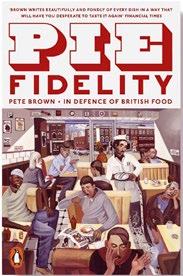
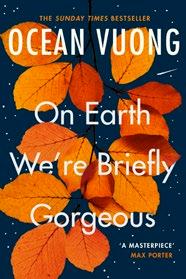

There have been a lot of people coming into the shop seeking remedies for anxiety and poor sleep during this time, and it feels good to be able to help them. Sometimes you're the only person they will speak to that day, and it's nice to be able to offer support and company to people. After a long day at work, reading is a form of escapism and definitely helps me relax—I can almost feel my blood pressure falling when I settle down with a good book. Vuong is a poet so the imagery of this book is just so beautiful. It is delicate and raw and emotive, and it really took my breath away. I sobbed when I had finished it. I'd recommend it because it lifts you out of your world and into his. I was immersed in the telling of this story, and it was good to feel someone else's experiences and pain instead of wallowing in my own.
Margaret Pearson, civil servant and school governor clerk
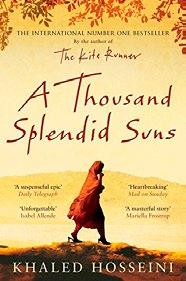
It is just a wonderful book. I have read it before, and I was waiting for the right moment to reread it. This year felt the right time, as the women in the book face so many challenges. It was a reminder that despite the pandemic, our lives remain relatively good. The book takes you on a journey, you feel like a part of the story and see everything from the perspective of the main character. You feel their pain and emotion while gaining an understanding of life for women in Afghanistan. I really did forget about everything else while reading and I just couldn’t wait to pick it up each time. I also rationed myself, so I didn’t read it too quickly—it kept the pleasure going for longer. I’m grateful that 2020 gave me that time to read.

* Zara, anti-terrorism finance analyst
Between giving birth at the start of the pandemic and heading back to work soon after, I’ve had little time to unwind. The idea of a book composed of short stories appealed to me because it felt more manageable. Every story was perfectly crafted and felt so deliberate and real. I always admire when an author possesses the ability to take you on a roller coaster ride through the darkest and strangest corners of their imagination and that’s what I found in this book.
It’s helped me completely switch off from the warped reality we’re all facing. For me that reality consisted of postpartum depression, loneliness, exhaustion, baby s**t and vomit. Not to mention the fact all of that happened in the middle of a global pandemic with no real access to family. This book made me laugh and made me focus on myself again.
This book really makes you laugh, and with such a challenging year behind us, we all need something to perk us up and escape to. I love Dolly Alderton's style of writing. I enjoyed her first novel and I knew this one would be just as good. I thought it was clever how she used the term "ghosting" in not only a physical sense of being ghosted by someone but in a metaphorical sense too.
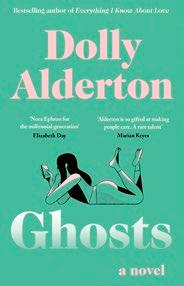
The past year has been hard because there has been no outlet or form of respite as you can't go anywhere or see anyone. Reading has been really good for me. I enjoy writing, and I have been doing it a lot more during the pandemic. Reading more has also really helped me to improve my writing.
• The name has been changed to maintain confidentiality

I haven’t been able to travel home as much as I’d like to this year, so reading books from home has made me feel more connected to my family and friends back in Belfast. Milkman is set in a nameless city full of anonymous citizens in the middle of a violent internal conflict—a facsimile of Belfast during the Troubles. Burns strips away all the cultural context and doesn’t acknowledge or even name any political entities in the novel. England is “the country over the water”, the south of Ireland is “the country over the border”, Catholics are “us”, Protestants are “them”.
The way the whole thing plays out is ridiculous and doesn’t make any sense. However, it did make me reflect guiltily on the fact that I have never been able to fully accept my Reebok trainers because they have a tiny Union Jack on them. The main way the pandemic has affected me is by making home feel much further away than it used to. I have read a few books by Irish authors recently: Anna Burns, Colin Barrett, Seamus Heaney, Flann O’Brien. It’s a good way to connect with home until it’s safe to travel again.
My partner of 11 years and I were due to be married in August 2020. There have been many date revisions, but we are hopeful and looking forward to sealing the deal sometime soon. He has been a shining sunbeam in this difficult year; but a liberal amount of Pinot Grigio and reading in the bath have also played quite a key role.
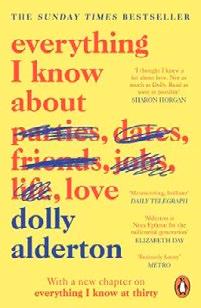
I loved the silly, messy, relatable vibe of Dolly Alderton’s memoir. The quote “Nearly everything I know about love, I've learned from my long-term friendships with women” resonated with me a lot.

Not only is this book a terrific read, but also, I see chess as very didactic and found comfort in the comparisons it holds with life. During the pandemic, views on life and security have changed. Not everything is in our control and no matter how calculated one is in applying order, chaos can ensue.
But in both life and chess, we must keep moving, and it’s through these movements we gain knowledge and insight. I’ve been delivering care to vulnerable adults, which is challenging at the best of times but exacerbated by current circumstances. Through reading, even if it’s about a game, I’ve gained perspective, and I was able to leave whatever situational tribulations I was experiencing behind, even if it was just for a few pages.
When things change every day, it doesn't feel like there's time or space to reflect properly. If there were, sadly, I wonder how many of the NHS workforce would struggle to come into work the next day. Books are a small remedy, helping us reflect on what has happened to us through reading about what has happened to others.

Call it schadenfreude or that comforting feeling of "things could always be worse," but there was just something therapeutic about A Little Life and its relentlessness. Coming in at just over 700 pages it follows the lives of four young men in New York, focusing on the utterly miserable protagonist Jude.
It's a slog—and weeks of pure literary therapy. It's a tough read but worth it for the beautiful writing and character arcs. It might sound dramatic but never before have I come to know characters in such an intimate way. When I finished it I was bereft. I wept so much I had to go to bed. In fact, I'm welling up now.


Before I began working there, deaths at the care home meant morale was low and many residents lost weight due to anxiety and upset. This book really helped in 2020 because I needed a way of shutting out the stresses and difficulties of the year. It helped me turn off after work as I was able to shut out everything and get fully lost in the drama!
I’ve dealt with the last year OK, thanks to family and friends. But reading has also played a big role—at the start of lockdown I made a list of books that I wanted to check off and read, and I started working my way through them. I bought a Kindle too, to make it easier to get books without ordering online. It was a hobby I could enjoy without having to risk even receiving packages.
Purple Hibiscus was emotionally challenging, yet it was interesting to read a book based on such a different culture and background. It highlighted the many ways race, sex and money can influence children’s upbringing but how family connections can get you through any of life’s challenges.
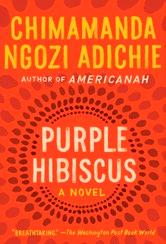
This book was simply a way to escape the realities of daily life in 2020, be that the struggles of lockdown, not being able to see family and friends and also getting through tough shifts dealing with death and grieving families. I’ve found connecting with friends in new ways to be a great way of keeping focused on what and who is important to me. Reading has been another way for me to connect with different worlds and explore how history, politics and current affairs affect our views.


My interest in anti-racism stemmed from working as a British-Indian employee in two predominantly white industries (marketing and sustainability). Through books like Queenie I learned that my experience of racism cannot be compared to that of a Black woman living in the UK. Via relatable situations from office politics, power dynamics and romances to embarrassing one-night stands, we are shown through Queenie’s first-person narrative the persisting presence of racism. It also highlighted the importance of knowing your worth, and appreciating true and genuine friendships; those who always show up, give you their precious time and are by your side through the good and the bad. I definitely owe much of surviving 2020 to those good, true friendships!
This memoir really touched me. The author’s persistence and constant fight for understanding and owning her own identity and voice in the world resonated with me a lot. It helped me look at my own privileges and be more grateful for life, especially amid the complaints and resignation the pandemic brought on. Reading definitely helped me to cope with the challenges of 2020. Mostly, I read memoirs or books based on true stories, but also romances or classics. It was definitely my way of carving out my own time and getting my head away from COVID for a bit.
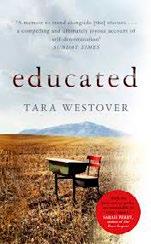
Escapism, perspective or offering us a way to reconnect with the world, this is how books soothe our minds and burn life back into us in times of hardship. Let us applaud the key workers in their efforts amidst this pandemic—and say thank you for the reading list too.
Jenessa Williams explores the surprising role that video games can play in managing our mental health

Nearly a year on, it is fair to say that the coronavirus pandemic has impacted us all. Stress, anxiety and isolation are all deeply understandable sensations in this age of uncertainty, and we all find different ways to get through it–TV, books, crafts or indeed, video games
While "gaming" might make you think of first-person shoot-em-ups or high-speed car racing, there is a softer side to video games too. From aeroplane flight simulators to virtual farming, players are taking more comfort than ever in meditative games of repetition and strategy, where "game over" is not an option so much as infinitely remodelling imaginary worlds. At their best, these video games can offer a real sense of immersion, and we’ve been drawn in our droves towards titles that offer simple, slow-paced gameplay, soothing in their lack of peril.
Whether you’re an experienced gamer or a technological novice, it’s never too late to try something new. Here, three gamers explain how their favourite meditative titles have helped them to manage times of grief, depression and isolation, turning their virtual worlds into a welcome escape.
HAVING EXPERIENCED SEVERAL close family losses, Kevin finds Football Manager to be a nostalgic, soothing way to manage his grief.
“I was staying overnight at a friend's house when I first
experienced the game that would become Football Manager. My friend’s parents had bought him a PC to help him with his schoolwork, and Championship Manager 2 was the only two-player game he had. Even though it took the best part of an hour to load a new game, we were always happy to wait.
Though my experiences with the effects of poor mental health started in childhood—my father suffered from depression and was both mentally and physically abusive—it has been coping with the loss of
loved ones that has really shaped me as a person. I’ve only just turned 40 but have lost a sister, my father, a nephew and, most recently, my mother. I was 18 when my sister died, and I became fairly self-destructive; I quit college and spent a lot of time at the pub to try and numb what I was feeling. With my mum’s help, I was just coming out of the cycle when Dad also passed. Two losses hit hard—my drinking grew to seven pints a night, my weight ballooned to 20-plus stone and I lost two jobs in quick succession.
I'M LEARNING TO COPE WITH MY GRIEF BETTER EVERY DAY, AND FOOTBALL MANAGER HELPS WITH THAT
Kevin, 40, has found playing Football Manager (left) soothing during times of extreme grief. Right; At his beloved Newcastle United


Again it was Mum who helped me out of my spin. She found me a part-time job where I was on my feet and talking with people all day. I started to make new friends, to exercise more and to drink less. I lost nine stone in two years and got my career on track before deciding to head to university, where I gained a first-class degree and found the love of my life. It’s been a little over two years since I lost my young nephew and my mother. I’m still recovering and processing the grief of both. Grief is different for everyone,
impulsive and win, or take a more methodical approach to success—it’s really up to you and what you find rewarding. I think that’s what makes it so popular—you can feel like you’re succeeding by simply being yourself. That sort of acceptance is all any of us truly crave.”
Doreen has used Nintendo's Animal Crossing: New Horizons to manage her anxiety and stay connected.
“I’ve always been a big gamer—my parents have a Polaroid photo of
ANIMAL CROSSING HASN'T "CURED" ME, BUT IT HAS ALLOWED ME TO FEEL MORE CONNECTED TO MY SUPPORT NETWORK
and while I have tried counselling, it’s been music and gaming that have helped me through the worst periods of my life. Mum and I were very close, and the void she’s left looms large. But I’m learning to cope a little better every day, and Football Manager helps with that. It might seem silly, especially to nonfootballing or gaming fans, but the escapism really relaxes me, and by the time I finish playing, I always feel like I’ve somehow reset myself.
Football Manager is an amazing way to put some distance between you and your worries. You can be
me on their bed with a Commodore 64 in front of me, playing Q*bert on their bedroom television. As a teenager, I borrowed my cousin’s PlayStation 2 to play Final Fantasy VII into the wee hours on a school night—I think it was 4am on a Tuesday when I finally finished!
I had originally played Animal Crossing on the GameCube in the early 2000s; it was incredibly distinctive in its utilisation of passing real-time, and I really enjoyed that it wasn’t a game to "beat". When it was announced that Animal Crossing: New Horizons would be released

on Nintendo Switch in 2020, I was incredibly excited. I was saving up to purchase a Switch Lite when my boyfriend surprised me with a console, which he gave to me in person right before the first UKwide lockdown. He mailed a copy of New Horizons to me, and I’ve been playing it solidly on a near-daily basis for the best part of a year.

Doreen has loved gaming since she was a child. Right; A polaroid of her playing Q*bert on a Commodore 64 in her parents' bedroom
in touch during the pandemic.
Many of the game’s achievements are reliant on quiet gratification: catching all the bugs and fish, unlocking abilities, making friends with the cute animals on your island. There’s always a new season to look forward to, villagers moving out or in, new ways to decorate your island. But what really makes it fun is being able to interact with friends ingame—a hugely welcome way to stay
Gaming is a great escape from problems and stress. My mother is diagnosed with bipolar disorder and hasn’t always been great at managing it, so I’ve long been vigilant to mental health, but it wasn’t until I had lived in the UK for a few years that I sought help for my own suicidal feelings, anxiety and depression, which led to a course of Cognitive Behavioural Therapy. After being signed off from work for stress in 2020, I began again with weekly NHS IAPT online counselling, which has been incredibly helpful for addressing my self-critical thoughts.
Mental health is something we all have to get more comfortable with talking about. Having anxiety
or depression is often seen as something to 'get over' rather than something to get ongoing help with. Animal Crossing hasn’t 'cured' me, but it has allowed me to feel more connected to my support network. Being in a long-distance relationship, the only time I’ve been able to see my partner during the pandemic has been online, often while playing New Horizons together on virtual dates. With a group of friends, I’ve started a chat group to keep track of the stalk market prices on our islands, and to swap fossils and furniture. I’m glad to have had something that has pulled us closer together.
I’ve recently signed up to Mind’s "Switch Off, Game On" campaign, which encourages people to play marathon online gaming sessions to raise money. Gaming has
always been something I just did quietly in my room, so the idea of broadcasting it seems quite strange! That said, I now know that it can be an incredible way to connect with others. I hope people enjoy watching me shake some trees!”
RACHEL HAS ALWAYS ENJOYED classic action fighter games, but prefers the comfort of violence-free Lego Adventure games when she’s feeling low.
"Ever since the 1980s, I've always had a computer. I was a big fan of storytelling 'choose your adventure' games, until one year when Dad bought me a Nintendo console. I was about eight. He got it second-hand off a friend, but when we plugged it in, it didn't work! He must have felt really guilty, because he went

Rachel normally loves fighter games, but when she's struggling with her mental health, it's the Lego series she turns to
out and got me the Super Nintendo instead, and it all started from there.
I happened upon the Lego Games by complete chance—a friend of mine was talking about playing them with his kids, and how much they all enjoyed them. I was a bit sceptical at first, but within half an hour of playing Lord of the Rings, I was completely taken by it.
I went through a really bad depressive episode about three years ago, where I ordered lots of Lego Games and played them for at least eight hours a day, every day. I was
immersive world, with all these little quests and details.
During that same depressive episode, a friend sent me The Last of Us, a zombie apocalypse survival game. It’s the sort of adventure I’d normally like, but I found that I was getting really anxious when I was playing it—physical cold sweats, tense shoulders. It’s one thing to be fighting zombies, but if you’re having a hard time dealing with the humans in your real life, you don’t want to be dealing with it in-game too! I had to turn it off and go back to Lego.
THERE ARE HORRIBLE EXPECTATIONS OF ADULTS THESE DAYS, WHERE WE'VE JUST LOST OUR SENSE OF PLAY COMPLETELY
hiding from my problems really, but it worked well to quieten the horrible negative thoughts that were roaring in my brain.
Lego games tend to be tethered to movies, and focus on following those familiar storylines—Harry Potter, Jurassic World, Indiana Jones. There are tasks to complete, but you can also do extra challenges to collect trophies and items. I think that sense of completion-achievement helps; it's a bit like, OK, at least I can do this one thing, I’m not a total failure.
I still like the Lord of the Rings game best—it feels like this huge
Hardcore gamers can be so dismissive of "fluffier" titles, but you have to just ignore that and focus on the things that work for you. There are horrible expectations of adults these days, where we've just lost our sense of play completely. If it feels calming for you and isn't hurting anyone else, go for it! Everyone should allow themselves space to find that kind of peace.” n
If you're struggling with mental health, speak to your GP, visit mind. org.uk or call Samaritans on 116 123 for confidential advice and support

Asturias, with its gorgeous sea-to-sky landscapes and world-class cuisine, is like a country all its own
BY Bruce Schoenfeld From NatioNal GeoGraphic
The pink-stone Basilica of Santa María la Real de Covadonga in the Picos de Europa (Peaks of Europe) National Park
This is a meal I could eat nowhere else, it occurs to me around the seventh course. I’m in the mountains of Asturias, and I’ve been served a dish of sea urchin and ham that unites the coast and peaks of this northern Spanish province in one bite. Two tables away, I see José Antelo raise his fork in triumph. Antelo is an air traffic controller in Barcelona. His brother, Luis, is a judge in Madrid. They live in two of Europe’s top restaurant cities; they can enjoy memorable meals night after night. But three or four times a year, they meet to eat in Asturias.
Asturias? This autonomous region of Spain lying along the Bay of Biscay, dense with trees that run up hillsides, dotted by wild marshland, and scalloped with tidy beaches, is hundreds of miles from

both those cities. “Nowhere else in Spain can you find so many flavours, such incredible variety, in such a small area,” says José. “It is like an entire country.”
We’re dining at Casa Marcial. Housed in an old mansion, or casona, decorated with window boxes and topped by a barrel-tiled roof, the restaurant sits at the top of a winding road in La Salgar, a mountain village that smells of pine. The coast is six miles to the north, but La Salgar remains so deeply embedded in the hilly, heavily forested interior of the region that, I’m told, many of its residents spend their entire childhoods without ever seeing the water. The Manzano family opened Casa Marcial in the middle of the last century as a general store, selling olive oil, cider, cattle feed, even clothing. In 1993, 22-year-old Nacho Manzano, the son of the owners, returned from the coast to start a restaurant. Gastronomes such as the Antelos love Casa Marcial, which has been awarded two Michelin stars. So do locals, who don’t dress up to eat there.
When I head back over the mountain to my hotel in seaside Gijón, it’s almost dawn. Walking in the November drizzle by the seawall, I pass a rowboat filled with fishermen. When I look around me, and remember the village I just left, José’s description hits home. Asturias is like an entire country.

RETURNING TO THE region for the first time in years, I’d driven north from Madrid a few days before. After hours on a flat brown mesa, at the northern edge of the province of León I entered the Negrón tunnel—and emerged somewhere else, in a land all its own. The highway curved through a valley rimmed with tall pines, past bulbous rock formations atop vertiginous slopes. I saw homes with picture windows cantilevered over stonepaved streets and ancient granaries perched on stilts. There had been no official demarcation when I passed from León to Asturias. But I hadn’t needed one.
I was heading for the Asturian capital of Oviedo, a compact city of roughly 220,000 residents separated from the slightly larger Gijón by rapidly encroaching suburbs. Each city has a proprietary social scene; you can be a VIP in one and all but
Above: Surfing lessons at Playa de San Lorenzo beach in Gijón, one of the most popular beaches in Asturias. Opposite: Fabada Asturiana, a rich bean stew, at Casa Marcial restaurant in La Salgar
unknown in the other. Oviedo has the better museums; Gijón has the beach. Twice a year, the Sporting Gijón and Real Oviedo football teams bring the rivalry to life before a full stadium.
Most visitors come upon Oviedo first. They seek out some of the best pre-Romanesque architecture in the world, 14 preserved buildings, including the tall ninth-century palace-church complex of Santa María del Naranco. I go there first, and enter a vaulted room made of stones the colour of milk-clouded coffee. Only one other person is here. The windows are cut thick into the walls, their shutters flung open. I peer over a grove of trees and
see the city spread out below. Within the hour I’m making my way through Oviedo and find sculptures on almost every corner; more than a hundred adorn the city. Before I reach my hotel, I pass “La Maternidad,” a rounded woman with an equally rounded child by Colombian sculptor Fernando Botero, then Miguel Ortiz Berrocal’s “El Diestro,” a metallic rendering of a bullfighter’s torso.
Oviedo’s artistic awakening has happened only over the last generation, just as Nacho Manzano started drawing international attention to his small restaurant in the mountains. “Before then, we didn’t think Asturias had much to offer the world,” explains Esther Manzano, Nacho’s sister, who has her own restaurant, La Salgar, in the centre of Gijón. “We didn’t believe in ourselves. We didn’t have fantastic

weather. We were a long drive from anywhere, there were no flights. We assumed that nobody would want to come.”
Then two things happened: Europe’s new bargain airlines began flying here in the late 1990s; and Woody Allen’s 2008 film Vicky Cristina Barcelona sent its characters to Oviedo for a weekend. “Woody Allen told the world we exist,” Esther says. “He opened the world’s eyes, but he also opened our eyes.” A statue of the controversial writer-director stands off Calle Uria.
Tourism has helped raise the standard of living in Asturias, but it hasn’t changed its nature. Spain entertained more than 80 million visitors last year, enough to overrun many of its best-known places: Barcelona has been transformed from the raucous port town it used to be. Madrid seems like an international shopping mall. Asturias, however, remains regional, strong-flavoured, authentic.
While Oviedo, like many inland cities, tends to be insular, overtly polite, and socially inaccessible, Gijón is a port town: working-class and occasionally profane, open to the sea and new ideas. Oviedo has an opera house and a full programme to fill it; Gijón prefers its series of avant-garde festivals. When I visited, the Jazz Xixón festival was underway, and I bought a ticket to see the experimental band Portico
Opposite: The Cathedral of Oviedo in the Alfonso II square. Right: Looking toward the city of Oviedo from the Church of Santa Maria del Naranco, a pre-Romanesque church built into a mountain near Oviedo
Quartet. It was easy to spot the blazing neon sign for the venue, Teatro Jovellanos, mounted above a pedestrian mall. Inaugurated in 1899, the theatre was renovated shortly after the fall of ruler Francisco Franco in 1975 and bought by Gijón in 1995. It has served as a cultural centerpiece since.
I spoke with Tonio Criado, the festival’s director, in the lobby underneath an enormous crystal chandelier. Criado grew up in a small inland town near Cangas de Onís before moving to Gijón. Now he wouldn’t live anywhere else. “It’s the youngest city in the region, and the freshest,” he told me. “You find that in our music, our cuisine, our way of life.” When I asked him whether he feels Spanish or Asturian, he didn’t hesitate. “Oh, Asturian. But really, I am from Gijón. What we are doing here couldn’t happen in Oviedo.”

17th-century peasant house, a covered alley where the bowling game cuatreada is played, a bagpipe museum (bagpipes are a common instrument in Asturias and Galicia), and several of the granaries—called hórreos—that are ubiquitous in the area. There is a food exhibit, and I’m astonished to see how rudimentary the kitchens were, even in urban areas, into the 1950s and 1960s.
THE FOLLOWING morning, I visit Gijón’s Museum of the Asturian People, a re-creation of a traditional village. The grounds include a
Many of the dishes made in those kitchens are now served at Esther Manzano’s restaurant, La Salgar. If Casa Marcial is where the Manzano
family adds an Asturian element to high gastronomy, La Salgar rewards Asturians with deliciously familiar food amid Gijón’s clamour. The idea was to have local diners taste quintessential versions of dishes they’ve been eating all their lives, such as arroz con pitu, the chicken, rice, and red pepper that every Asturian remembers from childhood. “Dishes of the home,” Esther declares, “served in a restaurant.”
Like San Francisco and Scotland, bad weather suits Asturias. I leave Gijón and head east along the coast under a steady drizzle. In August, Ribadesella attracts Spaniards desperate for a respite from oppressive heat. On a misty cool November morning, it’s a particularly lovely fishing village. Kids splash through puddles in the streets. Adults walk dogs. Shop owners stand in the doorways greeting friends.
Not far away is Tito Bustillo Cave, site of one of the more remarkable discoveries of the last century. In 1968 a group of amateur spelunkers discovered a magnificent series of cave drawings, dating back more than 10,000 years, on the walls. Another mysterious drawing was made some 30,000 years ago, according to carbon dating. Although the site has been validated by experts, its existence continues to raise questions. Why were drawings made in precisely the same place some 20,000 years apart?
I ponder that over lunch 15 minutes to the north, on a spit of beach. Güeyu Mar restaurant is a glorified shack where owner-chef Abel Alvarez has been grilling fish since 2007. His menu is whatever the boats have brought in that day, supplemented by seafood in tins that Alvarez has preserved. There’s no meat, rice, or potatoes; just seafood, local vegetables, and excellent bread rolls. I eat razor clams and sardines, grilled cockles and kingfish. I drink Asturian wine (which barely existed a decade ago), a blend of three local red grape varieties. Crisp and salty, it tastes like the sea.
Asturias has the Green Spain designation, reflecting the province’s pristine, verdant landscapes and cooler, wetter climate. A network of trails covers the region, headlined by the Camino del Norte, the quieter northern branch of Spain’s famous Camino de Santiago. Running from the French border to Santiago de Compostela, it skirts such Asturian highlights as the tidal blowholes of Vidiago and the paleolithic Tito Bustillo Cave
Rain is falling again; when I step outside, I

see a vivid rainbow arching from the hilltop trees down to the water. Then I pivot inland. I stop in the hill town of Cangas de Onís, where a much-photographed Roman bridge spans an unhurried stream. From there the next morning, it’s a short trip to Covadonga, one of Spain’s most historic spots. You could argue that modern Spain began when the Moors were halted here by the Visigoth nobleman Pelagius, the founder of the Kingdom of Asturias, in 718. Spaniards needed nearly 800 more years before they expelled the Moors, but the Battle of Covadonga marked the start of the reversal.
The setting is breathtaking, with a serpentine road leading up a canyon, past a waterfall and then a small shrine. At the top, shimmering above the mist, rises the majestic, pink-stone Basilica of Santa María la Real de Covadonga. I’ve visited before, but hadn’t seen the lakes above Covadonga in the Picos de Europa (Peaks of Europe) National Park. Now up another winding road I drive, bound for those lakes. Trees fall away, and the view opens to a sky of cottony clouds.
Then I hear bells. They start softly, but soon their jangle has drowned out the car radio. I round a bend and see several hundred sheep painstakingly crossing the road in
front of a line of stopped cars. I park and walk into the nearby brush, inhaling air so fresh that it sends a jolt of sharpness into my chest. The spiky mountain peaks surround me from a distance; all I hear is the din of the sheep bells, like church bells ringing. A driver honks in frustration, but that only makes the sheep stop in their tracks. With great deliberation, they look around, then resume their shuffle. Eventually the stragglers get across. By now, traffic probably snakes halfway down the mountain. The cars are starting to move, but I can’t walk back just yet. The bells clank and the air crackles and the peaks look like cathedral spires. Around me is a sea of sheep. I’ve never been anywhere like this. And I don’t want to leave. n
Note: the writer visited Asturias before the COVID-19 pandemic
Susannah Harrison enjoys a spot of history on her French holiday
There’s a thunder of hooves and clouds of orange dust as the horsemen charge at each other only a few metres in front of us. In a death-defying display of acrobatics and pyrotechnics, one of the knights is brought to the ground. It is the 12th century and Richard the Lionheart, third son of Henry II of England and Eleanor of Aquitaine is setting off for the crusades. The stunning re-enactment is set against the imposing backdrop of the ruins of Château de Talmont. As well as the skilled horsemen and women, the cast of the twice-weekly nocturnal entertainment includes dozens of actors in period costume. The story of Richard I is narrated in French, with atmospheric music and dramatic lighting filling the night.
By day, the chateau is alive with interactive displays of its


history—costumes to try on, medieval board games, calligraphy, archery and pony rides.
Talmont-Saint-Hilaire, in the Vendée region of France, was the destination of our annual family holiday until last year, when we had to cancel because of the COVID-19 pandemic. Unlike the camping holidays of my own childhood,



the mobile homes we stay in are positively luxurious. The campsite affords my children a relative amount of freedom to meet other young people, either at the multinational kids club, where they enjoy a range of timetabled activities, or informally in the games area or at the swimming pool complex.
The campsite itself provides entertainment from early in the morning when the first activities are scheduled, to late at night when families head to the bar area to watch magicians, singers or the campsite’s own entertainers. A short walk away, a path leads to a small shingle beach, where tiny hermit crabs in brightly coloured shells scuttle in the rock pools at low tide. Just a few miles along the coast, the shingle gives way to a vast expanse of golden sand, where we build sand castles and swim in the sea.
It’s very easy to spend all our time on the beach, but day trips further afield have taken us to Les Sables-d’Olonne, with its colourful carousel and quirky seashell museum, Noirmoutier-en-l’Île, “the Green Venice” of the Vendée with its network of narrow waterways, and the ancient Maillezais Abbey, where we have enjoyed even more historical tales about this fascinating region. n
Tell us about your favourite holiday (send a photo too) and if we print it, we’ll pay £50. Email excerpts@readersdigest.co.uk
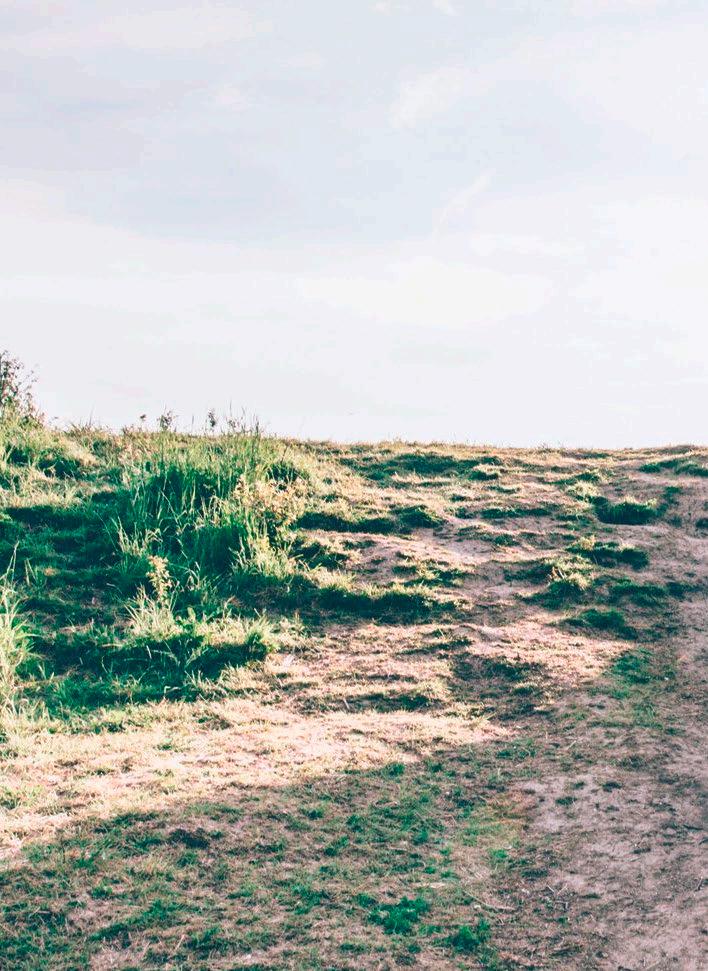
As Copenhagen routinely excels in charts of the world’s most livable cities, you’d be forgiven for thinking that its locals live idealised existences—healthy eating, the perfect work/life balance and so on—and need little egging on.
Apparently, though, some help is occasionally required. In 2016, artist Thomas Dambo hid The Forgotten Giants—six huge trolls assembled from waste wood and felled trees—around forests, lakes or meadows in Copenhagen’s leafy western fringes.
Each giant performs a function. Hill Top Trine’s hands double as a viewpoint, for example, while Teddy Friendly’s arm enables the fording of a nearby stream, and lake side Little Tilde contains 28 built-in birdhouses.
Specialising in fun sculptures using reclaimed or reused materials, Dambo hopes that his quirky-looking figures will encourage people to recycle. He also wanted to persuade residents out into their hitherto-overlooked local nature.
The sculptures are just as much fun for tourists to find, though, and they’ll thrill younger children. Dambo’s website contains a “treasure map” marking the spot where each giant hides. Less romantically, each is also on Google Maps.
To see every troll you’ll need either a car or a lot of taxi money. If you’ll be content seeing just one, then take the train to Brøndbyøster station, 13 minutes from Copenhagen Central and walk a mile north to Sleeping Louis. Alternatively, target Oscar Under The Bridge, near Ishøj Beach, and combine it with a visit to the excellent Arken Museum of Modern Art (arken.dk). Visit thomasdambo.com/works/forgotten-giants to learn more. n
By Richard Mellor

Since we started asking for your questions there’s been a huge variety of money matters you’ve asked for my help with. But one topic has been far more frequent in the “On The Money” inbox. So this month I’m devoting my entire column to answering your queries on pensions
Q: I have no idea how to access some pensions from early on in my career. Are there any tools out there I can use to find them?
Adrian, 70
This is really common, particularly if you’ve swapped jobs a number of times. You can find contact details for old workplaces and personal pensions via the government’s free Pension Tracing Service. Head to gov.uk/find-pension-contact-details or call 0800 731 0193.
Once you have these details, get in touch with the pension provider. It’ll help to have details on hand such as the dates you worked at the employer, or even better, any policy numbers.
Q: I recently read that if you care for grandkids, you can top up your pension. I look after my two grandsons twice a week and a while ago I paid extra money into my pot in order to have a reasonable monthly pension, which I have just started withdrawing. I probably wouldn’t have done so had I known! So have I read this correctly, and if so, is there any chance of backdating? Anon
Yes, you’re right! Grandparents or other family members can claim National Insurance (NI) credits if they are regularly looking after related kids under 12 years old. This needs
to be for at least 20 hours a week.
These “Specified Adult Childcare” credits can be backdated to April 6, 2011. So if you are short of the 35 years worth required to get the full state pension, these are well worth applying for.
I asked HMRC about whether you can get a refund for the voluntary payments and they advised you write to: National Insurance Contributions Office, HMRC, BX9 1AN, explaining your situation.
Q: A close friend has just been made redundant as an inevitable consequence of COVID. He’s just turned 59, and his occupational pension isn’t paid until he turns 60. Though he has been offered the option to take his pension early, this would come with an 8% per annum reduction. He is getting a fair redundancy package due to length of service and does have some savings.
Arthur, 61
Seeing as it’s just one year more your friend has to wait to claim the full amount, logic says it’s better to get by on savings and the redundancy cash. Perhaps even looking for a shortterm job to top things up if needed.
If he does want to take it early, I’d definitely talk to a financial advisor first. They can provide input on how it’ll impact his particular pension. Eight per cent more every year as an

annuity will make a big difference when you consider this is an income for life.
Q: I have worked and lived in Spain for most of my working life, though I am UK-born. I haven’t paid any UK National Insurance over the years, but I would like to come home to the UK for my retirement, to be closer to family and my growing brood of grandchildren. Would I be able to get any support here? I have a Spanish pension but that doesn’t amount to much. I am worried that I have been silly. John, 64
Though you need 35 years of contributions to get the full state pension, you qualify for a reduced sum as long as you have at least ten years of credits. You might have some years logged from before you moved abroad, and the years you contributed Spanish social security payments should also cover you to get to ten years.
However, the amount you receive will be solely based on the amount of money contributed to your UK National Insurance.
It might be possible to top these up. To do this you need to have lived in the UK for at least three years, and made NI contributions for a least three years before moving abroad.
If that’s the case, then men born after April 5, 1951 (it’s 1953 for women) can add up to ten years of contributions that were missed between 2006 and 2016. You need to do this by April 2023.
Top-ups work out at roughly £800 a year. In return you’ll get a payment of £232 each year added to your state pension. So it’ll cost close to £8,000 if you do this for the full decade, and you’ll get £2,300ish back each year.
This means you’re looking at three and a half years before you get the money back. But after that you’ll be receiving this level of state pension for life.
You can also continue to make voluntary payments for any further years before you claim the pension. Check how many existing qualifying years you have via gov. uk/check-state-pension, or call the International Pension Centre on +44 191 218 7777.
If this doesn’t work out then you could be able to claim pension credit, which can bring down the cost of things like council tax and heating. It’s a means tested benefit.
Q: I have worked all my adult life, besides the years when my children were young. I’m now 65, working part time and have claimed my work pension. Next year, I am eligible to claim the state pension, but should I defer this if I continue to work full time? I don’t know if it’s best to give up my job next year and claim full pension or to defer, because maybe then I could get more later on?
Karen, 65Claim the full pension and you’ll get £9,339.20 a year. A decent sum if you need it now, or would like to stop working.
Delay it instead and you’ll see the annual payment increase by 1%, every nine weeks. Do it for a year and this will be around £540 a year.
However it’ll take a while before you make enough extra to cover the money you didn’t take—roughly 17 years for a single year deferment.
Plus if you die while the state pension is deferred then it could also impact how much of this fund a spouse can inherit. When you do start claiming it, the increased amount could also impact your eligibility for benefits. n

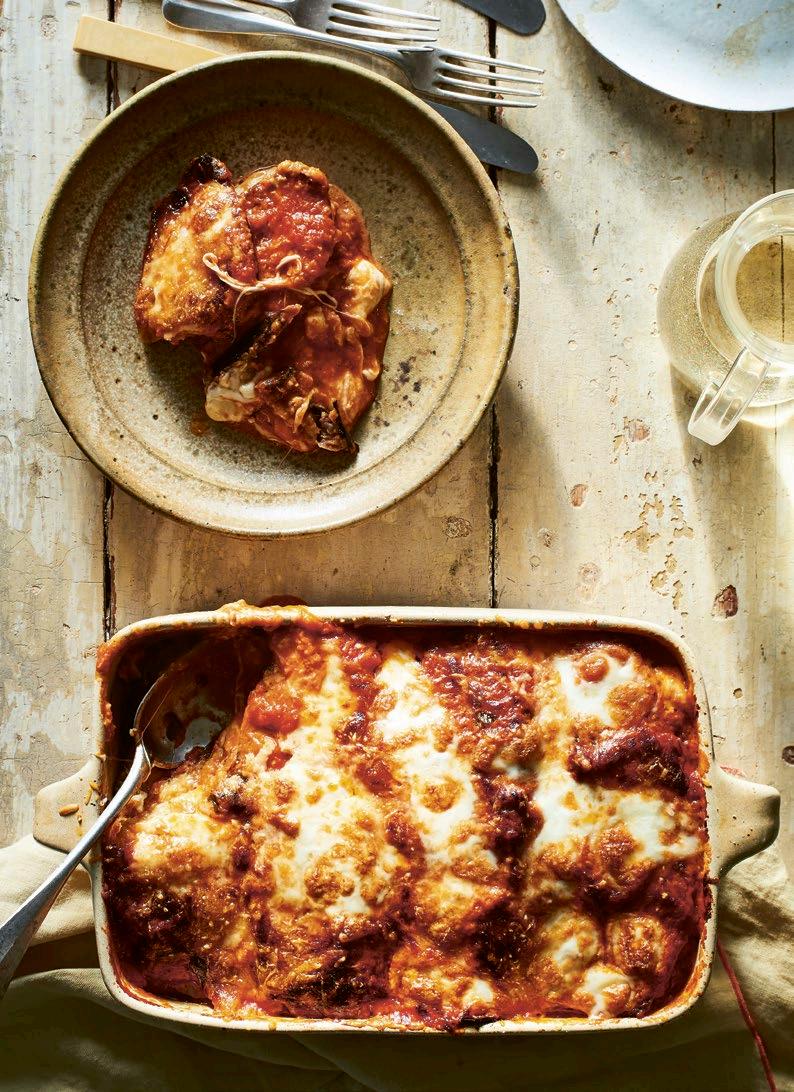
An all-time classic from southern Italy, this combination of sweet aubergines and tomato baked with mozzarella and Parmesan is a real treat. It reminds me of our summer holidays in Puglia and a restaurant called Osteria Bell’Italia. This version is a blatant copy of the dish on their menu—but sometimes good recipes are just best left alone. I make Melanzane Parmigiana quite often and it is one of those recipes that seems to send an alarm out to family… It doesn’t matter how much you make, it goes immediately. It’s vegetarian but meat-eaters love it, as the texture of the aubergine, tomato and hot melted cheese is so comforting. I actually think it always tastes better the next day, when it has been reheated. That’s if you have any left…
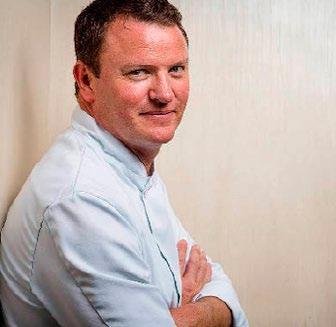
1 Place a heavy-based saucepan over a medium heat. When hot, add 3 tablespoons of olive oil and the garlic and fry for 30 seconds, until the garlic is soft but has no colour. Add 4 basil leaves and cook for 30 seconds, then add the passata, reduce heat and cook for 15 minutes, until the sauce has reduced by half. Tear in the remaining basil and add the remaining olive oil. Season and set aside.
2 Slice the aubergines into 1cm (½in) rounds. Transfer them to a colander and sprinkle with salt. Leave for 20 minutes to draw out the liquid, then pat the slices dry with kitchen paper.
3 Have ready the beaten eggs in one bowl and the flour in another. Heat the sunflower oil in a frying pan over a medium heat. Dip each aubergine slice into the egg to coat, then place in the flour, taking care to fully coat each slice. Shake off any excess flour, then fry, in batches, for 3 minutes on each side until they are all cooked through and have a nice, golden colour. Place on kitchen paper to drain.
4 Preheat the oven to 180°C/160°C fan/350°F/Gas Mark 4. Lightly oil a baking dish. Arrange a layer of cooked aubergines evenly in the bottom of the dish, spoon over one third of the tomato sauce, sprinkle over one third of the chopped mozzarella, and sprinkle over one third of the Parmesan. Repeat the layers twice more, finishing with the final layer of Parmesan. Bake the parmigiana for 35 minutes, or until the top is golden and crispy (give it up to another 10 minutes, if you need to).
Serves 4
• 4 tbsp olive oil, plus extra for oiling
• 1 garlic clove, finely sliced
• 8 basil leaves
• 600g (1lb 5oz) tomato passata
• 4 aubergines, half peeled to give stripes (to help the aubergine cook evenly)
• 3 organic eggs, beaten
• 200g (7oz) tipo 00 flour
• 100ml (3½fl oz) sunflower oil
• 200g (7oz) mozzarella, chopped
• 100g (3½oz) Parmesan, finely grated
• sea salt
• black pepper, freshly ground
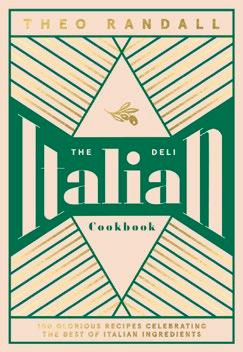
The Italian Deli Cookbook by
Theo Randall (Quadrille, £26)
Photography: Lizzie Mason
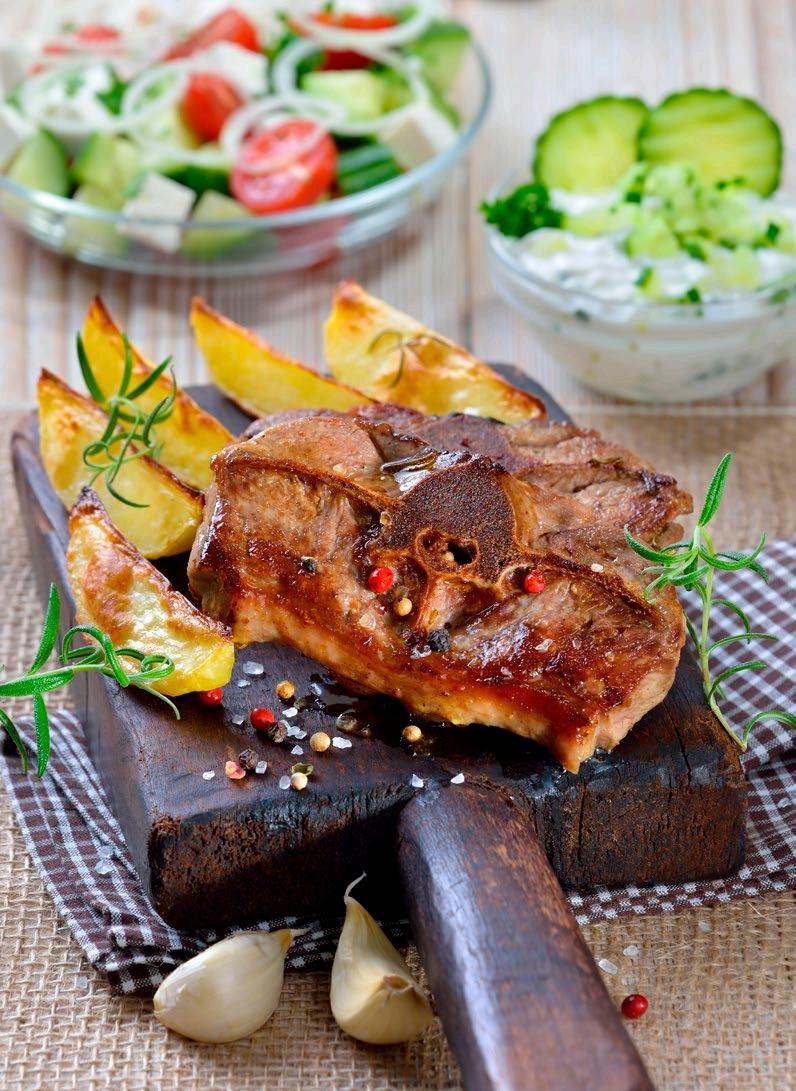
If the prospect of another lamb roast this Easter leaves you a tad underwhelmed, you might want to give this classic Greek pairing a go. It’s easy to cook, doesn’t involve painstaking preparation and can act as an exciting Mediterranean twist on traditional Easter lamb with its garlicky marinade and brightly flavoured tzatziki sauce—a staple of Greek cuisine. Weather permitting, you can grill the chops outside, however, they’ll turn out just as delicious cooked in a grill pan inside
Method:
1 Make the sauce: grate the cucumber and drain through a fine mesh sieve.
2 Combine the yogurt, garlic, oil, vinegar, and salt in a large bowl.
3 Transfer the grated cucumber and dill to the yogurt mixture and stir to combine. Cover and refrigerate for at least 1 hour.
4 Next, marinate the lamb: in a large baking dish, add the oil, dill, garlic, chili flakes, and lemon juice. Season the lamb chops generously with salt and pepper, then add to the marinade and turn to coat. Cover and set aside to marinate at room temperature for 1 hour.
5 Heat a charcoal or gas grill to medium-high. Grill the lamb, turning occasionally, until it has reached the desired temperature, 4–6 minutes for medium rare. Alternatively, heat an oiled grill pan over medium-high and cook, turning occasionally, until the lamb is browned on all sides, around 6–7 minutes. Transfer to a platter and let rest 5 minutes. Serve with tzatziki sauce, warm pita bread and/or a simple green salad.
Serves: 2

Cooking time: 80 mins
Ingredients:
For the lamb
• 3 tbsp olive oil
• 1 tbsp fresh dill, finely chopped
• 6 cloves garlic, finely chopped
• 1⁄2 tsp red chilli flakes, crushed
• 2 tsp fresh lemon juice
• Kosher salt and freshly ground black pepper
• 4 lamb loin chops
For the tzatziki sauce
• 1/2 a large cucumber, unpeeled
• 500g plain full-fat
Greek yogurt
• 2 large garlic cloves, minced
• 2 tbsp olive oil
• 1 tbsp white vinegar
• 1/2 tsp salt
• 1 tbsp minced fresh dill
Spring has sprung, and—like clockwork—many of us have started on the annual spring clean. Luckily, you don’t need to go to great lengths to freshen up your home! Even a simple afternoon of cleaning and tidying can make a notable difference, especially if you have good storage solutions in place.
With this in mind, I’ve been busy reorganising my home studio this month. Although, being a crafter, this is easier said than done… pencils, knitting needles, craft knives and scissors are usually strewn across every available surface. But I’ve come up with a quick and easy solution: DIY desk tidies. They’re simple to make, and can be easily customised to match your favourite colour scheme. And the best bit? They’re crafted from completely upcycled materials, so they’re a sustainable solution too.

Mike Aspinall runs one of the UK’s most popular craft blogs, The Crafty Gentleman, where he shares free DIY tutorials
You will need
Tin can, a few scraps of durable fabric, strong fabric glue, fabric scissors
How to make your desk tidy
1. Remove the lid from your tin and give it a thorough clean, being careful of sharp edges. Leave to dry.
2. Cut a strip of fabric approximately 4cm wider than half of the height of the tin (so if the tin is a standard 11cm, the fabric should be 9.5cm wide). Cut the fabric strip so it’s long enough to wrap all the way around the tin, plus a 2cm overlap. Iron out any creases if necessary.
3. Apply a few dabs of fabric glue across the top edge of the fabric (on the wrong side of the fabric). Fold this edge down and press in place to hem it.


4. When the hemmed edge has dried, apply some glue to the lower half of the tin. Wrap the hemmed fabric around the tin, so the hemmed edge sits neatly in the centre. Firmly press it into place with your fingers so it sticks in position.
5. Add a little more glue to the overlapping edges of the fabric and then press them together. One raw edge will remain exposed, but the adhesive will prevent it from fraying.
6. Hold the fabric in place for a few minutes, then wrap a few elastic bands around it to hold it tightly in place. Leave to dry for 24 hours.
7. When it’s dry, tuck the lower edges of the fabric over the sides of the tin. Glue them in place on the bottom of the tin, making sure you smooth them out so the tin still sits flat and even.
8. Repeat this process again with a contrasting piece of fabric, this time sticking it to the top half of the tin.
If you want to make this project even simpler, you could use just one piece of fabric to cover your desk tidy. Simply cut your fabric to a larger size at the start, and skip the “hemming” step (no need to do this, as both ends of the fabric will be tucked over the edges of the tin and hidden from view). Then place it on your desk, fill it with all those odds-and-ends, and enjoy the space it frees up! n





750 billion tons of ice are melting every year. That’s a rate we just cannot afford…
To understand the knock-on impact of ice melting around the world we first have to understand what an ice sheet actually is. Covering 5.4 million square miles in Antarctica and 656,000 square miles in Greenland (our two remaining ice sheets today) an ice sheet is essentially a huge mass of glacial land. These sheets, over thousands of years, form by snow accumulating and compacting into ice over the winter, which doesn’t entirely melt during the summer. This ice, home to a throng of diverse animals, is now melting at a rate that cannot sustain the life it currently holds. Many of these creatures rely on ice sheets as land for resting, hunting and protection, yet as the size decreases they are forced out of their natural habitats in search of other land on which to reside. Often this means long, drawn-out journeys to search for food and an imbalanced ecosystem arises when different species are forced together onto the coast.

which freezes more quickly underfoot and makes it harder to walk and search for food. In the summer, permafrost melts and releases previously trapped diseases which the herds have no modern immunity to. A similar destiny has befallen the polar bears who suffered a 40 per cent population loss between 2001-2010. Quite apart from these existing tragedies, the imminent threat of sea levels rising if the ice caps were to disappear is ever looming.
If the Greenland Ice Sheet thawed, the sea level would rise around six metres, and if the Antarctic Ice Sheet thawed, sea levels would rise by around 20 feet. To put this in perspective, sea levels have risen about eight inches since 1880, three of which we’ve gained over the last 25 years. This seemingly small amount has already caused dangerous flooding, loss of farmland and more deadly hurricanes and storm surges.
Since the 1990s, the caribou population has declined by 56 per cent—climate change has caused warmer temperatures over winter triggering rainfall instead of snow,
While we’re still a long way from losing the ice sheets all together, we’ve already lost too much for many ecosystems and humans to reasonably survive under, and if we don’t take climate change seriously now, we will inevitably hit the point of no return. n
by Jessica Lone SummersDr Caroline Coch is a polar specialist at the World Wide Fund for Nature

How are polar bears affected by climate change? Sea ice is vital to polar bears. It provides a platform for them to hunt, live, breed, and in some cases, create maternal dens. But sea ice is more than a simple platform: it is an entire ecosystem inhabited by plankton and micro-organisms, which support a rich food chain that nourishes seals, that in turn become prey for polar bears.
Current research suggests healthy polar bear populations will be unable to survive long-term in areas where the sea ice disappears for much of the year.
What don’t people understand about ice melting? Land ice, such as ice caps and sea ice play a vital role in our global climate system driving air and ocean currents around the globe. They can be imagined as the air conditioner of our planet. Being white, they reflect more of the Sun’s energy back into space— this is what we call the “ice-albedo feedback”. When that ice disappears, more heat is absorbed by the underlying water or land accelerating the warming even further. This has consequences for all of us—rising sea levels, changes in climate and precipitation patterns, increasing severe weather events—and effects on globally important animals.
What would happen if we lost the Arctic in the future?
Massive ice loss is already happening in the Arctic and will continue to happen until at least 2050 unless we take urgent action to cut greenhouse gas emissions. This loss of ice is fundamentally changing our global climate system. The Greenland ice sheet, for example, holds enough water to raise global sea levels and the numbers are even bigger for the Antarctic ice sheet. Around 40 per cent of people worldwide live close to the coast, and are affected by rising sea levels.
Losing the ice masses would also have fundamental impact on the planet’s weather—not just because of the albedo effect, but because this will affect the ocean currents that move heat around the globe—partly why in the UK we have such a temperate climate. We would be living in a much warmer climate and would experience even more severe weather events.
For people who live in the Arctic, climate change impacts their livelihoods, identity, health and cultural practices.
Ice is not just found at the extreme ends of the earth either. In the Himalayas, millions of people depend on the annual meltwater from the glaciers. If this were to be lost, it would have huge implications for all those who are living downstream. n
Our new fashion columnist Catherine Summers dedicates her first pages to extolling the virtues of bright and bold waterproofs
April is traditionally a month known for its showers, yet given the unreliable nature of the British weather we’re all too expectant of rain at any time. I’m most certainly not a rainy day fan (I always long for hot summer days), but I do find joy in cheerful rainwear. In terms of my style choices I’m no wallflower, but flowers—or any other bold print—on a raincoat? Yes please.
The choices of raincoats available are pretty standard fare: there’s your classic beige trench coat, with black and navy usually offered as other available colours. While classics are always a safe bet, I do tend to push the boat out when it comes to my own outerwear.
I’m putting a case forward for the patterned mac, or at least a bold colour that’s not considered a "classic". One of my favourite raincoats is my SS15 Hobbs trench in

Catherine Summers is an award-winning fashion blogger, posting regularly on her website, notdressedasalamb.com and on her Instagram account, @NotLamb
a stunning honeysuckle pattern. I wear it every spring without fail. The bold pattern and bright, fresh colour makes my heart sing—how can you feel blue wearing such a joyful raincoat? Unfortunately Hobbs don’t currently offer their iconic Saskia trench in anything other than solid colours, but they always offer brights so it’s possible to avoid the beige and black.
Finding bright and/or patterned raincoats and trenches online turned out to be harder than I thought. A quick search resulted in just a few results: it seems your best bet for something a little more daring than a beige trench is Boden. The Tiverton Raincoat is available in a beautiful soft pink, the Haddon Mac comes in rainbow check and even the Morris Waterproof Mac is offered in "Surf", a very pale blue with white and chartreuse stripes. It reminded me of Pantone’s Colours of the Year for 2021, Ultimate Gray and Illuminating (soft grey and a cheerful yellow).
If money were no object, I’d splash out (pun intended) on a Paul Smith pink check coated mac. The ultimate in a bold check of pink, yellow, green and apricot, it’s an explosion


of colour that flies in the face of the British weather. And if the occasion called for it, I’d add some patterned wellies to finish the look.
I currently own a pair of pink and red striped welly boots from The Wide Welly Company. Doing what they say on the tin, it’s a brand perfect for those of us who’ve long since given up on finding Wellingtons that fit over our calves as well as our jeans. You won’t find any plain black wellies on their site: I’m eyeing up the hot orange ones as I fear I’ll be wearing out my striped pair considering how much I wore them during the constant rain we had through winter.

So I’ll be wearing my blue floral trench with my striped red wellies on repeat this spring; pattern mixing is a long-term love of mine. I know it’s a Marmite style choice, but what I wear affects my mood greatly and anything bold is it for me. Therefore, I urge you to think about brights or patterns, or both, for your rainwear this year. It’s been a long hard 12 months of on and off lockdowns and restrictions, so don’t restrict yourself to safe neutrals if the weather is trying to beat you back down.
Rise up and wear your waterproofs with joy and pride. Your mood will thank you for it. n
Beauty expert Jenessa Williams considers the usefulness of moisturing your mani
Though most of us are used to the benefits of a good hand cream, we often forget just how delicate our fingers can truly be. Available in droppers, rollerballs, balms and industrial-sized bottles, cuticle oils are designed to target the very specific area of translucent skin that grows around our nails, protecting us from invading bacteria.
Between all the handwashing and anti-bacterial sanitising we’ve been doing lately, it’s no surprise that our hands and nails might be feeling a little dry or brittle. Formulated with rich ingredients, cuticle oils help to strengthen nails by adding moisture, encouraging growth and reducing peeling or hangnails around the nail bed.
For nervous nail biters, certain formulas can even help you break the habit by leaving a sour taste, or can help to strengthen the natural nail before applying (or when removing) a gel or acrylic manicure.

Whether you’re looking to create a new self-care habit or to restore long-neglected natural nails in the absence of salon trips, a few drops of cuticle oil can go a long way. Get yourself into the habit of applying nightly the same way you would a handcream or face serum— massage in gently, and allow to soak in its own time. Apply extra after washing up or using nail varnish remover to really keep the moisture locked in.
With so many formulas out there on the market, take some time to select a product that really feels luxurious to you. Vitamin E, almond oil and apricot are all great ingredients for nail growth, while lavender, milk and honey will gently soothe any inflamed skin and slot easily into a gentle night-time routine. Treat your cuticles kindly, and your whole body will feel the benefits. n
by Jenessa WilliamsOver the past year, Reader’s Digest has navigated the woes and wonders of modern life, weighing in with leading experts on the everyday tools we need to survive and thrive in the modern world. And what better time than lockdown to catch up?
To subscribe to Digested and listen to all our episodes so far—including tips on sleep, the menopause and reducing your plastic consumption—visit readersdigest. co.uk/podcast or search “Digested” on iTunes.




James Norton gives a masterclass in drama acting in this poignant story of a father and son at a crossroads
This film is a perfect example of how world-class acting can elevate the simplest of stories to a genuinely moving, retrospective experience that helps you re-connect with your most deep-seated emotions. The simple story? A young father searches for a replacement family for his little boy, when he’s diagnosed with a terminal illness. Ineptly acted, Nowhere Special could’ve ended up as emotional porn with the sole purpose of exploiting and titillating us with the characters’ tragedy.
Instead, what unfolds is a thoughtful, tender piece about belonging and the true meaning of the word “family”. James Norton plays John—a 35-year-old
window cleaner and single parent to the timid yet adorable, Michael. We can tell something’s up with John’s health early on, as he opens his bathroom cabinet, chock full of medication, staring blankly at his tired reflection in the mirror. Around Michael, though, he’s transformed: a caring father who emanates love and kindness. Yet most of John’s time is occupied with finding his son the perfect family to settle into when he’s no longer there.
Norton’s acting is what really drives this film—the process of coming face to face with your own mortality, coupled with parental instincts to protect your child—that’s no easy emotional state to convey. Yet Norton delivers a dignified performance that might bring a tear to the eye of even the toughest viewers.
Eva Mackevic
This playful yet reflective documentary follows the day to day adventures of a stray dog, Zeytin, on the busy streets of Istanbul. The Turkish government dictates a no kill, no capture policy towards all stray animals, meaning dogs can freely roam the city on their own terms. Zeytin, then, is just one of the hundreds of mutts traversing the streets in search of food, playmates and a bit of sympathy. With her huge, deep eyes and an expression full of wisdom and contemplation, she is an arresting screen presence; a canine equivalent of Marlon Brando of sorts—without the attitude. A life-affirming musing on survival and even the meaning of life, you’re bound to fall for Stray—especially if you have a soft spot for dogs.
OLD YELLER (1957)—a classic family film about a boy’s love for his dog, featuring one of the most beloved pups in cinema history.
I AM LEGEND (2007)—one of the greatest on-screen portrayals of the unbreakable bond between man and dog, set in dystopian NYC.
ISLE OF DOGS (2018)—a beautiful, animated feature following a boy’s odyssey in search of his pooch, from the visionary director, Wes Anderson.
TOGO (2019)—a heartening, timeless story about a sled dog in the wintry Alaskan tundra, starring Willem Dafoe.
Springtime in Paris, anyone?
The runaway TV hit of early 2021 has been Lupin (Netflix), a crossChannel collaboration—created by Brit George Kay, shot in the French capital—in which the toweringly charismatic Omar Sy follows in the footsteps of author Maurice Leblanc’s shape shifting gentleman thief, Arsène Lupin. The first batch of episodes, in which Sy’s Assane Diop attempts to right a wrong Parisian high society committed against his father, proves limber, playful escapism from the off; in true serial style, further installments are promised over the summer.
In his excellent film work, Danish writer-director Tobias Lindholm has favoured decidedly on-the-nose titling (A Hijacking, A War). With the similarly no-nonsense Investigation (iPlayer), Lindholm makes an assured transition to TV, shadowing the police inquiry into the murder of journalist Kim Wall aboard a homemade

AufWiedersehenPet (BritBox/iPlayer)
Franc Roddam’s ratings-courting tale of Brit brickies in Europe merits revisiting in this post-Brexit moment: the originals are on BritBox, the revival on iPlayer.
submarine over a spare, slow burn, quietly potent miniseries. Furrowed brows and long, fruitless trawls of the seabed for evidence are the order of the day here; patience is (and surely was) required, but rarely has the burden of proof been so starkly dramatised, and so profoundly felt. Channel 4’s streaming service All4 has bolstered its overseas imports with Ramy, the Trojan horse of recent US comedy. On the surface, these are funny, thoughtful slices of life about a twenty-something (likable stand-up comic Ramy Youssef) cohabiting with his family in latterday New Jersey. What’s new—at least for US television—is that the family is Egyptian-American, and Ramy himself a practising Muslim. Like the wonderful Fresh Off the Boat (on Prime Video), it’s another notable recent example of TV’s ability to transport us into other cultures from the comfort of our own couches.
by Mike McCahill
Jazz fans are in for a real treat this month as Hammond organ legend, Dr Lonnie Smith, releases eight tracks of untethered joy, entitled Breathe. Smith, who earned his “Dr” title for “doctoring up” other musicians’ tunes with his own unique stylings, has been a jazz scene mainstay for six decades now and has played with everyone from Dizzy Gillespie to Etta James. His new record is an elegant, uplifting collection of six live songs recorded in NYC during his birthday celebrations, plus two studio tracks featuring none other than rock legend, Iggy Pop.

All About That Hammond
The Hammond Organ was the first electronic musical instrument to become commercially successful when it went on sale in 1935. Churches made up the largest share of Hammond buyers, accounting for half of all sales in the 1930s as the instrument was advertised as a lower-cost alternative to the winddriven pipe organ.
Breathe is a slice of heaven for any Hammond organ connoisseur; its soulful sounds effortlessly cascade down the melodies, shape shifting between bona fide gospel that takes you to church on tracks like “Pilgrimage”, and summery bossa nova with Iggy’s slow-moving vocals on “Why Can’t We Live Together”. That’s one of the greatest things about this record: it truly showcases the instrument’s incredible versatility and the ability to elevate songs of any genre.
Elsewhere, wild saxophone solos blaze across tracks like “Track 9”, and gentle drum brushes whisper seductively on “Too Damn Hot”—the Doctor put together a truly capable team of musicians who can run with his virtuosic organ improvisations. If you’re starved for a taste of live music, Breathe is a quality, copper-bottomed jazz record that will remind you of the heady magic of seeing a great artist let loose on stage.
by Eva MackevicIt then quickly became popular with jazz musicians, with Jimmy Smith widely credited as the figure to bring the Hammond organ to the forefront. Smith’s widespread influence resulted in a huge increase in the number of organs used in jazz, and his legacy continues to this day with his protégés including Tony Monaco and Joey DeFrancesco.

TV presenter Mel Giedroyc enters the world of literature with an affirming tale of self-discovery
The Best Things by Mel Giedroyc (Headline Review, £12.99)
Mel Giedroyc’s fictional debut is being hailed— admittedly by its own publishers—as “the publishing event of 2021”. Presumably, they’re hoping it might even emulate the all-conquering success of Richard Osman’s The Thursday Night Murder Club , another first novel by a muchloved TV presenter. But whereas Osman was content to lean on the traditional whodunit, Giedroyc casts her net much wider, drawing instead on more or less every trope in modern commercial fiction.
When the book begins, Sally Parker is living an apparently enviable life. Her husband, Frank, is a staggeringly

James Walton is a book reviewer and broadcaster, and has written and presented 17 series of the BBC Radio 4 literary quiz
The Write Stuff

wealthy hedge-fund manager. Staff take care of the family’s Surrey mansion, and of their four children, even though the youngest is 11. But, Sally can’t help wondering, Whatever happened to the simpler, happier people she and Frank were before they had all that pesky cash?
Well, as you might imagine, she soon has the chance to find out. But that’s only one of the book’s many, many plot-strands, as Giedroyc continues to assiduously tick every commercialfiction box, from Internet-obsessed teenagers to status-obsessed middleaged women, feisty and sweary old ladies to any number of hopeless men.
In fact, once all this is in place, the book rattles along very nicely for a
while, with Giedroyc’s writing having the same undeniable charm as her TV appearances. The trouble is that the sheer number of characters—and relationships between them—leaves her an awful lot of endings to serve up. So how will she manage it? The answer is by putting them off as long as she can and then providing a sudden avalanche of reversals and flat-out coincidences that just about wrap everything up—if perhaps in the manner of someone forcing the lid down on an over-filled suitcase.
Of course, it’s not unknown for writers to put everything they can think of into their first novel. It’s also true that most of what Giedroyc can think of is fun to read. Yet, while nobody can possibly complain of a lack of storytelling generosity here, they might also feel it’s the kind of generosity displayed by Mrs Doyle in Father Ted: “You’ll have some more, go on, go on, GO ON!”
Can you guess the writer from these clues (the fewer you need the better)?
1. His 2014 novel—which became a BBC drama last autumn—has the shortest title of any book that’s ever topped the bestseller lists.
2. An earlier book, and an even bigger seller, was set on St Swithin’s Day over 20 consecutive years…
3. …and was called One Day
ShuggieBain by Douglas Stuart (Picador, £8.99). Last year’s brilliant Booker Prize winner about growing up with an alcoholic mother in 1980s
Glasgow. By turns tragic, funny, tender and excruciating.

Mistresses by Linda Porter (Picador, £9.99). An eye-popping history of the many mistresses of Charles II, solidly researched and told with great verve.
The End of Her by Shari Lapena (Corgi, £8.99). The latest mercilessly twisting thriller from the author of the best-selling The Couple Next Door.
The Ratline by Philippe Sands (W&N, £9.99). Riveting account of senior Nazi Otto Wächter before, during and after the Second World War, when he fled Germany with Vatican help—and of why his son still forlornly believes that he was a good man.
RedheadbytheSideoftheRoad by Anne Tyler (Vintage, £8.99).
Another shrewd yet kindly novel about the mysterious business of family life by one of the world’s great writers.
Answer on p126
A deep dive into possibly the most asked question known to man: what happens when we die?
Fifty years ago—at the beginning of Dr Bruce Greyson’s distinguished career as a psychiatrist and academic—a student called Holly was brought into the emergency room, having taken an overdose. As she lay unconscious and on the brink of death, Greyson, who’d just spilt bolognaise sauce on his tie, talked to her roommate Susan in a room along the corridor. The following morning, Holly awoke for the first time and he introduced himself.

apparent inexplicability. Over the years, he’s collected and studied hundreds of NDE stories, most of which share several characteristics— among them out-ofbody experiences, a sense of serenity, some sort of divine being and the appearance of dead relatives (including ones the experiencers didn’t know were dead at the time).
“I know who you are,” she replied, explaining that she’d seen and heard him talking to Susan with a red stain on his tie.
For Greyson, this was the start of a lifelong fascination with neardeath experiences (NDEs) in all their
As a result, his initial scientific scepticism has been overthrown by what he considers to be the incontrovertible evidence. Not only are NDEs real, he concludes, but they have huge implications. Most significantly, they suggest that the brain and the mind (aka consciousness) are separate things. After all, how else could people continue to experience themselves as themselves even when their brain is
officially dead? Indeed, from all he’s discovered, “some form of continued consciousness after death seems the most plausible working model”.
Here, from the early days of his NDE research, is a man called Al, who was in surgery for a quadruple bypass and, during the operation, came to, and found he was “looking down on the room from above”…
‘As I looked down,’ Al continued, ‘to my amazement, at the lower left-hand side was—of all things— me! I was lying on a table and I was cut open to expose my chest cavity. In this cavity I was able to see my heart. I was able to see my surgeon, who appeared to be somewhat perplexed. I thought he was flapping his arms as if he was trying to fly.’
‘What do you mean?’ I asked. Al demonstrated by placing his palms on his chest and wiggling his elbows. This struck me as too bizarre to have really happened. A surgeon flapping his arms in the middle of an operation? In all my years in the medical field, I’d never seen or heard of a surgeon doing such a thing. It’s also not the kind of thing you see surgeons do on television shows. It sounded a lot more like a strange dream caused by the general anaesthesia.
‘Would you mind if I talked with him about it?’ I asked. ‘Be my guest,’ Al said.
Al’s surgeon, a straitlaced
Japanese American with an excellent reputation, agreed to meet me, and was eager to hear about Al’s current condition. Much to my surprise, he confirmed what Al said. He told me that during his surgical training in Japan, he’d developed a peculiar habit that he’d never seen an American surgeon use. After he had ‘scrubbed in’ to the operating room and donned sterile gloves, he didn’t want to risk touching anything. So while he watched his assistants begin the operation, he planted his hands on his chest, flat against his sterile gown. He then supervised his team, using his elbows instead of his fingers to point out various things.
I asked the surgeon how he made sense of Al’s claim to have seen all that. He shrugged. ‘My family is Buddhist,’ he said. ‘Everything doesn’t have to make sense to us.’
I began to wonder whether Al might have seen his surgeon ‘flapping his arms’ before he was
After: A Doctor Explores What Near-Death Experiences Reveal about Life and Beyond by Bruce Greyson, MD is published by Bantam Press at £16.99
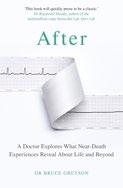
completely anesthetised. So I asked Al what else he had observed at the time. He said that he saw his chest held open by metal clamps, and two other surgeons working on his leg. That puzzled him, because his problem was with his heart and he didn’t expect anyone to be messing with his leg. In fact, the surgeons were stripping a vein out of his leg to create a bypass graft for his heart. This detail clearly established that Al had been completely unconscious when he’d witnessed the cardiac surgeon flapping his arms. He couldn’t possibly have seen that bizarre behaviour with his eyes, because his brain was fully anesthetised and his eyes were taped shut—something that is often done to keep patients’ eyes from drying out if they’re going to be anesthetised for a long time and unable to blink. He shouldn’t have been able to see anything. And yet he did.
’’
And the name of the author is… David Nicholls—whose 2014 novel Us beat the shortest-title record previously held by Frank McCourt’s ’Tis. The BBC version starred Tom Hollander and Saskia Reeves


Wilder Penfield devoted decades of pioneering research to mapping out the functions of the various parts of the brain by stimulating them with electric currents. But when Penfield stimulated the part that made his patients’ arms and legs move, they didn’t think they were moving their limbs. Instead, they felt Penfield was forcing their limbs to move— against their will. Penfield summed this up at the end of his career: “When I have caused a conscious patient to move his hand by applying an electrode to the motor cortex of one hemisphere, invariably the response was: ‘I didn’t do that. You did.’ There is no place in the cerebral cortex where electrical stimulation will cause a patient to decide [to move their hand].”
Clearly Penfield’s patients could tell the difference between their own minds wanting their limbs to move and their brains making their limbs move because Penfield was applying electrical current. They were convinced their brains and their minds were different things.
Kathy Reichs is a US crime writer, forensic anthropologist and academic. Her new and 20th novel in the Temperance Brennan series, The Bone Code, is out on April 29, published by Simon & Schuster

One Christmas, aeons ago, I was gifted a copy of ThePasswordtoLarkspurLane by the pseudonymous Carolyn Keene. The plot involved a mysterious coded message, an old woman in peril, and an eerie phenomenon in a creepy dark forest. To my eight-year-old mind, the young female protagonist had it all: independence, supportive friends, a cool dad, her own roadster. And she had secrets to uncover! After blazing through my first Nancy Drew book, the tenth in the series, I was hooked. Starting at the beginning, I began collecting every one of the little blue tomes with their brightly illustrated covers.

In school, I would grasp concepts quickly and finish assignments early. Then, bored, I would become a problem. To keep me occupied, my teacher devised a scheme. She cajoled me into reading the classroom’s small library in its entirety. Since most of the collection dated to decades before my birth, I was to evaluate the appeal of each book to me and my peers. One of my early choices was written by the Norwegian adventurer, Thor Heyerdahl. In 1947, to test his theory of a South American origin for the peoples of Polynesia, Heyerdahl and a small crew spent over three months crossing the Pacific on a handbuilt balsa raft. KonTikiis the story of that sailing adventure. Storms. Whales. Sharks. It was all so very exotic and thrilling to a child stuck at a desk.


In the1990s, I was fortunate to share a dinner table with my friend and colleague, Dr William R Maples. In 1994, Bill had released a non-fiction work entitled DeadMenDoTellTalesgiving the backstory of his career. It describes his analyses of the bones of celebrities, both recent and historic, and presents cases involving the examination of the nonfamous. When I broached the idea of penning a thriller with a forensic anthropologist as protagonist, Bill told me to go for it. This encouragement helped me to write my first novel, DéjàDead
The Oscars is scheduled to finally take place later this month, having originally been planned for January. And the ceremony will cap off one of the strangest and most disruptive years in Hollywood history.
The most striking example of this came last December, when Warner Bros announced that its entire 2021 slate of releases would be going digital first in the US, it’s most important market. It’s likely the same will happen in Britain too. This means that most people will be watching the most high-profile blockbusters like Dune and the fourth Matrix film not in the cinema but on the small screen.
However, it’s not just about the pandemic. COVID has merely accelerated existing trends. Because film streaming and the role of Big Tech in the film industry is shaking up the entire economics of filmmaking.
Today, the biggest players in the film industry are streaming services: there’s Netflix, Amazon Prime Video,

Apple TV+, Disney+, and US telecoms company AT&T, which owns Warner, has its own streaming service in the US called HBO Max, which is expected to launch worldwide this year.
And this changes everything. For instance, though Hollywood has always had some creative accounting practices, it is now completely plausible that films do not have to make a profit in order to be successful.
Why? Because instead of worrying about selling tickets to individual films, these companies are much more interested in maintaining your monthly subscription fee. So everything they do is designed around reducing "churn"—the worry that one day you may decide that you don’t really need to pay £10 every month for Netflix, and will cancel.
So instead, streaming companies are more interested in their investments paying off not in the short term at the box office, but in the long run. A streaming service is additive: the deeper the library of content is,
the better it is for the viewer. So Netflix doesn’t really care if you watched The Queen’s Gambit when it premiered last year, or if you watch it in ten years' time, just as long as you can find something to watch when you log on.
Streaming is also changing the form of what we watch. For instance, when Disney decided to make Star Wars spin-off The Mandalorian, it made it as an eight-part TV show, not a movie.
This wasn’t a trick to save money, as the show still reportedly costs Disney $15m for each episode. But it’s because the more important thing for streaming services is increasing the time you’ve spent watching, so you feel as though you are getting more value from it. Even better for Disney: if you watch as the show is released week-by-week, you’ll have to keep subscribing for two whole months to follow it through to its conclusion.
Perhaps the strangest transformation though is the business models behind the streaming services. For everyone aside from Netflix, film and TV is just a value-add for where they really make their money.
The only reason Apple has a
streaming service is because it's a source of recurring revenue. Over time a monthly fee is more valuable than a one-off iPhone purchase, and is more likely to lock you into another iPhone purchase in the future, if they can watch Apple TV on it.
Disney actually makes most of its money from selling holidays to Disney theme parks. What Disney really wants you to do is book a pricey trip to Disney World in Florida. Disney+ is really about making your kids fall in love with their characters.
And what about Amazon?
Ultimately, it is all about Amazon Prime, the company’s subscription service that bundles its streaming offering with other products and services, such as free shipping on goods that you’ve ordered.
Amazon knows that if you were to ask someone individually if they would be willing to pay a monthly or yearly fee for free next-day shipping from one online shop that might be a hard sell. Of course you can wait a couple of days for that delivery. But once the company has hooked you in with the promise of some blockbuster films and TV shows… well, you’ll suddenly find yourself buying a lot more from Amazon too.
Or to put it more succinctly, Amazon CEO Jeff Bezos famously summed this approach up, telling the website Business Insider that “when we win a Golden Globe, it helps us sell more shoes.” n
Win £30 for your true, funny stories!
Go to readersdigest.co.uk/contact-us or facebook.com/readersdigestuk
My father-in-law passed away earlier this year and my husband and I went to the crematorium to discuss arrangements.
The lady who met us turned out to be an old school friend of mine. She explained that due to the pandemic, the limited number of mourners would have to come in separately, sit two metres apart and maintain social distance at all times.
Then, just as we were about to leave, she said, “Ah, let me give you a hug before you go.”
MARY ROSS, Essex
I hate the snow but my husband loves it.
"What better time of the year is there to make your lawn look as nice as your neighbour's?” he said.
GERI BURTON, Denbighshire
My wife is always last to finish a meal. At breakfast with my fiveyear-old granddaughter, while my wife got dressed, I remarked that Granny might take a while.
She replied, "Was she born slow?"
OLIVER UNDERWOOD, Stirlingshire
My daughter was looking at her friend in her newest outfit.
"You're so slim" she commented. Knowing she wanted to lose some pounds, her friend mentioned she could do something about it if she wanted to.
"That's a great idea," my daughter retorted, and offered her friend a very large slice of a chocolate gateau from the fridge!
JANET AITCHISON, Merseyside
Am I getting older or has the supermarket started playing really good music?
LUKE HAMMETT, Cheshire
When playing I Spy with our sixyear-old son, he declared “I spy with my little eye, something beginning with M”.
After guessing incorrectly for what seemed like an eternity we finally decided to give up. Our son then

"SORRY, DAD, BUT I DON'T WANT TO BE THE EASTER BUNNY!"
pointed to the balcony and proudly said, “Miranda”.
Once we stopped laughing we explained to him that it was a veranda and that it actually began with a V.
CLED HERBERT, Northumberland
My second husband and I were on holiday with my son, his wife, and their six-year-old, Ben.
We had had lunch by the pool and my husband had gone up to our room by the time the waiter arrived with the bill.
My son said he would sign it for his father and the following conversation then ensued:
Ben: "But he's not your father, Grandpa Kevin is."
Son: "Well, he is my step father."
Ben: "What’s a stepfather?"
Ben’s mum: "If I married someone else, he would be your stepfather."
Ben (clearly concerned): "But if you married someone else, then who would look after Daddy?"
MARGARET ANNE ROBERTSON, Kent
My son's teacher looked at her pupils and said "Oliver, this is the fifth time I’ve had to punish you this week for not doing your homework. What have you got to say?"
Oliver stared at her solemnly and followed up with, "Well, thank God it’s a Friday!"
AMIE YARDLEY, Cambridgeshire
A friend was boasting about her son who she said was always playing "doctors" and she was sure it was a sign he was going to be a doctor himself one day.
One day, I saw him pick up a toy stethoscope and play with it.
"Listen," he told me, while he proceeded to speak happily into the instrument.
"Welcome to McDonald's!" he announced, "May I take your order please?"
ANNABEL HAMMET, Cheshire
The elderly lady in front of me at the queue at the COVID-19 vaccine clinic was asked the standard question, "Do you take any blood thinning tablets?"
I don’t know if she misheard but her answer was, "No, I’ve never been on a diet in my life!"
LIZ TUBBY, NorfolkIt’s never been easier to enjoy the world’s favourite magazine!







YES I want to subscribe to Reader’s Digest Magazine for just £3 for 3 issues (a saving of £8.37 on the shop price of £11.37 based on the cover price of £3.79 per issue). I understand that if I do not wish to continue receiving Reader’s Digest after my first 3 issues I can simply cancel my subscription by contacting customer services. If I do want to continue to subscribe after my first 3 issues I need do nothing and my subscription will automatically be renewed at the low rate of £7.50 for every 3 issues until I decide otherwise.

The challenge is on, Word Power fans! We canvassed some Reader’s Digest editors for their favourite words, and they answered the call in top linguistic form. Are you game? Answers on the next page
BY EMILY COX & HENRY RATHVON1. antediluvian adj. A: at dusk, partial darkness. B: environmental. C: belonging to the period before the biblical flood, old-fashioned.
2. bamboozle v. A: get drunk on cheap alcohol. B: deceive. C: get quickly out of control.
3. blandish v. A: coax with flattery. B: wave like a flag. C: tone down.
4. pellucid adj. A: easy to understand. B: frozen solid. C: innocent of a crime.
5. debacle n. A: annual celebration. B: sudden collapse, fiasco. C: utter surprise.
6. bluster n. A: sloppy kiss. B: aggressive or indignant talk with little effect. C: pitfall.
7. onomatopoeia n. A: the use of words whose sound suggests the sense. B: repetition. C: speech impediment.
8. echelon n. A: braid of hair. B: medieval criminal. C: level of command, step-like formation.
9. spelunking n. A: racing on snow sleds. B: lifting weights. C: exploring caves.
10. sanguine adj. A: naturally cheerful, confident. B: melodic. C: of or relating to the sun.
11. brouhaha n. A: group of witches. B: practical joke that goes wrong. C: uproar.
12. obfuscate v. A: snatch away from. B: make obscure. C: set on fire.
13. deride v. A: laugh contemptuously. B: dismount. C: exterminate.
14. pusillanimous adj. A: catlike. B: odorous. C: cowardly.
15. detritus n. A: unpaid bills. B: loose material, debris. C: gap between two teeth.
1. antediluvian—[C] belonging to the period before the biblical flood, oldfashioned. Her parents had antediluvian ideas about what time she should come home after a date.
2. bamboozle—[B] deceive. Don’t let the smooth car salesman bamboozle you with sales talk.
3. blandish—[A] coax with flattery. They blandished the guard into letting them through the prison gate.
4. pellucid—[A] easy to understand. The physics professor had a knack for giving surprisingly pellucid lectures.
5. debacle—[B] sudden collapse, fiasco. The CFO took full responsibility for the technology company’s financial debacle.
6. bluster—[B] aggressive or indignant talk with little effect. The politician can bluster all he wants, but he’ll have to let it go in the end.
7. onomatopoeia—[A] the use of words whose sound suggests the sense. With on-screen bursts like "kapow", the Batman TV series was famous for its creative use of onomatopoeia.
8. echelon—[C] level of command, step-like formation. After years
of faithful service, she is now in the upper echelon of city officials.
9. spelunking—[C] exploring caves. An interest in geology research led Andrew to adopt spelunking as his favourite hobby.
10. sanguine—[A] naturally cheerful, confident. Jay’s sanguine disposition made him a pleasure to be around.
11. brouhaha—[C] uproar. A brouhaha erupted over her statements about the president.
12. obfuscate—[B] make obscure. Could these instructions possibly obfuscate the construction of my shelves any further?
13. deride—[A] laugh at contemptuously. Alex derided his sister for entering the talent show, but she got the last laugh after winning it.
14. pusillanimous—[C] cowardly. Bert Lahr played the pusillanimous lion in The Wizard of Oz
The measurement of cloudiness of liquids
Alternative suggestions: "Measuring system for giants"
15. detritus—[B] debris. Vinnie photographed the leftover detritus of the city streets for his abstract essay.
VOCABULARY RATINGS
5 & below: Good effort
6–10: Keen contributor
11–12: Dictionary devotee
13-15: Word Power wizard
1. Which common cloud type most resembles a fluffy white cotton ball?
2. Which flightless creature is the largest bird on Earth?
3. The leopard seal is an apex predator on which continent?
4. What was the first human-made object to orbit the earth?
5. What is the real name of Who Wants to Be a Millionaire’s “coughing Major?”
6. Heart attacks are more common during spring, compared to other seasons. True or false?
7. In Western art, what is a memento mori?
8. In which country were robotic wolves with flashing red eyes recently deployed to scare off bears?
9. What Spanish building did Frank Gehry design using software first made for the aerospace industry?
10. A factory in the US sells around 80,000 washboards each year to customers who use them for decorating, washing clothes or what other purpose?

11. Which form of arthritis most commonly affects the large joint of the big toe?
12. Which one of these technologies is the newest: the compass, irrigation or gunpowder?
13. What beloved children’s book characters were created by Finland’s Tove Jansson?
15. Rhubarb’s stems are delicious and nutritious, but which part of this plant is toxic for humans?
14. Initially, many European scientists didn’t believe this animal was real because it seemed to be part mammal, part reptile. What is it?
10. Making music. 11. Gout. 12. The compass, which dates as early as the 11th century. 13. The Moomins. 14. The platypus. 15. The leaves.
8. Japan. 9. The Guggenheim Museum Bilbao.
6. False: they’re more common during winter and summer. 7. A symbol or artwork intended to remind the viewer of their mortality.
Ingram.
Answers: 1. Cumulus. 2. Ostrich 3. Antarctica. 4. The Soviet satellite Sputnik 1. 5. Major Charles
Photo: Shutter S tock/Diana t aliunChallenge yourself by solving these puzzles, then check your answers on p139
Move the numbers from the outer ring onto the board. Each number must be placed in one of the five cells that lie in the direction indicated by its chevron. The numbers must snake together vertically, horizontally or diagonally so they link in sequence from 1 to 25 (for example, 2 must be adjacent to both 1 and 3). There’s only one solution. Can you find it?
Each letter in the grid stands for one of the whole numbers from 1 through 9. No two of them represent the same number.
With the help of the clues, can you figure out which letter stands for what?
1. B × F = the two-digit number AB
2. B + J = G
3. D × D = the two-digit number BC 4. One of the rows contains only odd numbers.
Amar, Oriana, Rosa and Brodie each have a different favourite activity from among the following: rock climbing, kayaking, cooking lessons and zip-lining. Can you figure out who likes what, based on the following clues?
✦ Amar’s favourite activity isn’t rock climbing.
✦ Oriana is afraid of heights.
✦ Rosa can’t do her favourite activity without a harness.
✦ Brodie likes to keep his feet on solid ground at all times. (1 to 25)
This map shows Luisa, her destination and three train routes she can take to get there. Each segment of track has a different speed limit, indicated by the speeds shown. The distances of each segment are indicated by their colours and the legend to the right. Presuming that each train always goes at the top permitted speed and doesn’t stop anywhere along the way, which route (A, B or C) is the fastest?
A standard double-six set of 28 dominoes has been arranged in a rectangle. Can you draw in the lines to show the placement of the dominoes? We’ve listed the 28 dominoes so you can cross them off as you find them.
Replace the question marks with mathematical symbols (+, -, ×, and ÷) to produce the correct answer. Perform calculations in order, left to right.
Amar likes to zip-line, Oriana likes to kayak, Rosa likes rock climbing and Brodie enjoys cooking lessons. Trains
Route A, which will take 70 minutes.
WIN £30 for every reader’s joke we publish!
Go to readersdigest.co.uk/contact-us or facebook.com/readersdigestuk
As we left the restaurant, my beautiful date whispered to me, “We should have dinner again.”
I said, “No thanks. I’m full.”
Submitted via email
It’s been snowing for two days now, but it can’t afford to settle in London.
Comedian RICHARD VRANCH“Let them post pictures of cake!”
—Marie Internette Seen on Twitter
For a laugh, I put on a Disney Dumbo filter for my online meeting. I was a bit disappointed though, nobody mentioned the elephant in the Zoom.
Comedian BARBARA NICE
We should try another national clap, but have everyone use two halves of a coconut so that we terrify France into thinking we have a giant horse.
Seen on Facebook
Ice skating is wild. Someone was once brave enough to walk onto a frozen lake and say, “You know what my feet need? Knives!” Seen on Twitter
Working as a conductor on a ghost train was all tickety boo.
Comedian OLAF FALAFELI’ve been trying to arrange a game of hide and seek, but good players are hard to find.
KEITH LODGE, HullWhat is the Easter bunny’s favourite kind of music? Hip-hop!
Seen online
I got a bee.




It’s true, I do get high on brake fluid. But I can stop anytime I like!
Comedian IAN POWER
“He’s pronounced dead”, said the kiwi introducing their father.
EMILY RAKE, via email
People used to be so shocked when I told them that my children are made out of hair.
Raised a few eyebrows, I can tell you.
Comedian GLENNY RODGE
I’ve really gotten into snail racing but I’ve been losing a lot recently, and trying everything to make my snail faster. I even tried taking off his shell, but it just made him sluggish.
Seen on Reddit
I didn’t exactly ace my “capture the wasp” exam.
TIMOTHY PATRICK, Northampton

THESE HILARIOUS PHOTOS ARE PROOF THAT TODDLERS WILL SLEEP ANYWHERE… via boredpanda.com


My son, Bob, was only 5,8 when he left for university. He worked through the Christmas holidays and didn’t return home again until the February break. When he got off the train, I was stunned at how much taller he looked.
Measuring him at home, I discovered he now stood at 5,11. My son was as surprised as I was.
“Couldn’t you tell by your clothes that you’d grown?” I asked him.
“Since I’ve been doing my own laundry,” he replied, “I just figured everything had shrunk.”
Seen on Facebook
What did Yoda say when he saw himself in 4k? “HDMI!”
Submitted via email
I woke up this morning and my pillow case was covered in sticky crumbs. I guess I shouldn’t have gone to sleep with my hair in a bun.
VIVIENNE CLORE, via Twitter
“Hi, I’m Howard, and I’m an alcoholic, a drunkard, a souse, a booze hound, a lush. Thanks for coming to this meeting of Alcoholics Synonymous.
Comedian HOWARD MITTELMARK
Most people are shocked when they find out what a bad electrician I am.
Seen on Twitter

Twitter users ruined some of our favourite romantic songs by adding just one word…
@Kristibeann: Take My Morning Breath Away
@Stellina429: When a Man Loves a Different Woman
@KatieFournier: Quit Playing Games With My Heart Monitor
@Caffeine748: Can You Feel the Love Handles Tonight?
@NotReally_Kyle: Help Me Move, Rhonda
@INTJ: We’ve Only Just Begun Quarantine
@TheUmptenthDoctor: Somebody Else to Love
@PSIFly: I Just Called To Say I Don’t Love You
Across: 1 Nappy, 4 Fantastic, 10 Scouse, 11 Saucepan, 12 Whispered, 13 Amber, 15 Old hat, 17 Shepherd, 19 Scissors, 21 Expose, 22 Carry, 24 Hungarian, 27 Scabbard, 28 Ninety, 29 Hailstorm, 30 Swede
Down: 2 Alcoholic, 3 Paul’s, 5 Abscess, 6 Taut, 7 Steamship, 8 Image, 9 Dejection, 14 Detergent, 16 Hasdrubal, 18 Restarted, 20 Shudder, 23 Accra, 25 Renew, 26 Pact

We chat to the hilariously sharp Eleanor Tiernan
WHO OR WHAT INSPIRES YOUR COMEDY? I find animals very funny. In my current show I have a story about how I had an encounter with some cats that showed me how to handle social media better.
DO YOU HAVE A FUNNY TALE ABOUT WHEN THINGS WENT WRONG ON STAGE? I was performing once in a small cramped venue where the audience were right by the stage
(pre-COVID-19, of course) and I made a guy laugh so hard he spat his drink all over me. It was disgusting but I couldn’t be too hard on him because it was partly my fault for being too funny.
WHAT’S THE BEST PART OF PERFORMING? I often get to see other performers’ shows for free. There’s so much talent and variety out there. Some of them couldn’t be more different yet we all have our place on the entertainment smörgåsbord.
WHAT’S YOUR FAVOURITE OF YOUR OWN JOKES? You know you’re emotionally dead inside if you can eat a whole packet of lovehearts without reading the messages.
WHAT’S YOUR PET PEEVE? When people try to recycle things just because the packaging describes it as recyclable. You have to check with your local council and make sure they have the facilities to take it.
WHAT SUPERPOWER WOULD YOU CHOOSE TO HAVE? It would be fun to be able to squirt ink at people like a squid underwater and swim away. I’d need to be able to breathe underwater too though. Can I have two superpowers please? n
Eleanor Tiernan’s special, Success Without A Sex Tape, is available on BBC Sounds

Think of a witty caption for this cartoon—the three best suggestions, along with the cartoonist’s original, will be posted on our website in mid-APRIL. If your entry gets the most votes, you’ll win £50.
Submit to captions@readersdigest.co.uk by April 7. We’ll announce the winner in our May issue.

Our cartoonist faces another loss this month as his caption, “It might be ‘officially’ Groundhog Day, but it’s felt like it for the past year…” failed to beat our reader Julie Halliday, who won the majority with her caption “Is that the famous masked singer, Justin Beaver?” Congrats Julie!

Jarvis Cocker
The Britpop icon and Pulp frontman looks back on his incredible life and career
The prolific US visual artist and writer on what he would change if he was in charge of the world
Discover the fascinating history behind burying our beloved pets + PET CEMETERIES
LAUGH

keep sending you catalogues and great offers from Fashion Friendly and other brands affiliated with Kingstown Associates Ltd. If you would prefer not to receive these, please tick this box . We think you’d enjoy some of the latest products and offers by post from trusted retailers,organisations & charities. If you would prefer not to receive these by post, please tick this box . To learn more about our partners and how we use your data, see our privacy policy at www.fashionfriendly.uk.com
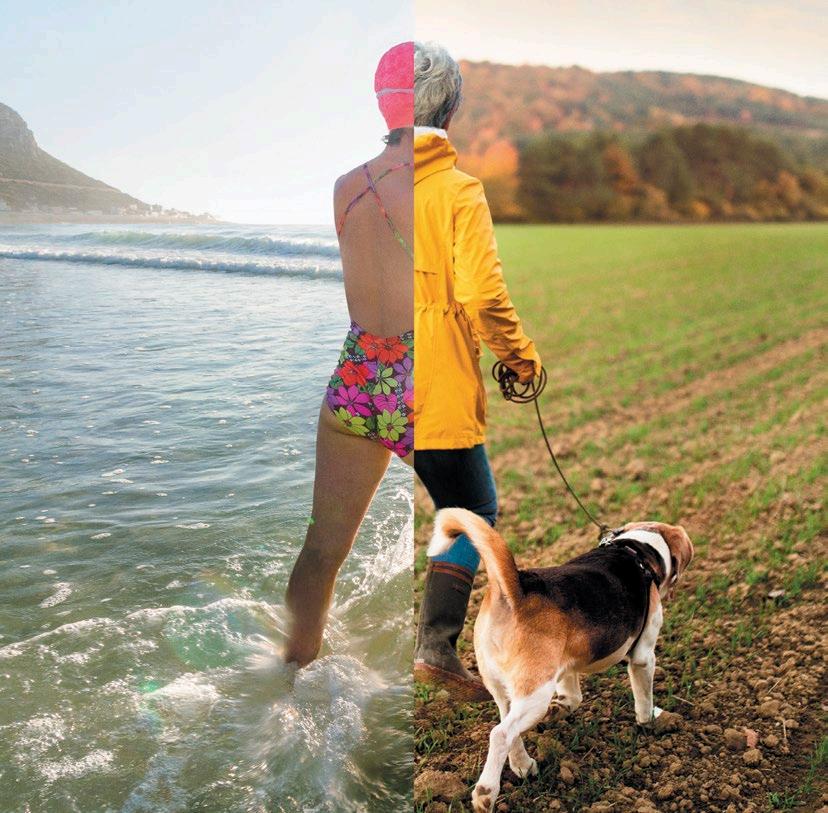

Response Premium by Doro connects seniors to loved ones or a fully-trained care team at the touch of a button on their mobile phone. So, they can get out there and keep doing what they love – and so can you.
Available at ee.co.uk/doro





